Author: Bao Ngan Nguyen
การทำบุญเป็นส่วนสำคัญในชีวิตทางวัฒนธรรมและจิตวิญญาณของหลายๆ คน โดยเฉพาะในพระพุทธศาสนา แต่คุณเคยสงสัยไหมว่าการทำบุญจะอธิบายเป็นภาษาอังกฤษว่าอย่างไร? ในบทความนี้ เราจะมาศึกษาวิธีแปลความหมาย และวิธีการใช้งานวลี “ทำบุญภาษาอังกฤษ” ด้วยตัวอย่างที่ใช้ในชิวิตจริง คำศัพท์ที่เกี่ยวข้อง และสถานการณ์ที่พบบ่อยในชีวิตประจำวัน
ไปทําบุญ ภาษาอังกฤษ
การทำบุญ ภาษาอังกฤษมักจะใช้คำว่า to make merit หรือ to do good deeds ซึ่งหมายถึงการกระทำสิ่งที่ดีเพื่อสะสมบุญ โดยปกติจะเกี่ยวข้องกับกิจกรรมการกุศล การช่วยเหลือผู้อื่น หรือการเข้าร่วมพิธีกรรมทางศาสนา การทำบุญถือว่าเป็นส่วนสำคัญในวัฒนธรรมหลายแห่ง โดยเฉพาะในประเพณีของพระพุทธศาสนา
นอกจากนี้ คำว่า merit-making ก็มักจะถูกใช้ในบริบทนี้ด้วย เพื่อแสดงถึงการกระทำเฉพาะที่ช่วยเสริมสร้างบุญให้เพิ่มพูนมากขึ้น

คำศัพท์เกี่ยวกับชีวิตประจำวันในศาสนาพุทธ
| คำศัพท์ | การสะกดคำ | ความหมาย |
| To make a merit | /tə meɪk ə ˈmɛrɪt/ | ทำบุญ |
| To meditate | /tə ˈmɛdɪteɪt/ | นั่งสมาธิ |
| To offer foods to monks | /tə ˈɔːfər fuːdz tə mʌŋks/ | ถวายอาหารแด่พระสงฆ์ |
| Donate | /dəʊˈneɪt/ | บริจาค |
| Sprinkle the holy water | /ˈsprɪŋkl ðə ˈhoʊli ˈwɔːtər/ | พรมน้ำมนต์ |
| To walk with lighted candles in hand around a temple | /tə wɔːk wɪð ˈlaɪtɪd ˈkændlz ɪn hænd əˈraʊnd ə ˈtɛmpl/ | เดินรอบโบสถ์พร้อมกับถือเทียนที่จุดแล้ว |
| Blessing | /ˈblɛsɪŋ/ | คำอวยพร |
| Five Precepts | /faɪv ˈpriːsɛpts/ | ศีลห้า |
| Eightfold Path | /ˈeɪtfoʊld pæθ/ | อริยมรรคมีองค์ 8 |
| An act or thought which has no longer any potential force | /ən ækt ɔr θɔt wɪʧ hæz noʊ ˈlɔːŋɡər ˈɛni pəˈtɛnʃəl fɔrs/ | อโหสิกรรมหรือปล่อยวาง |
| To pray | /tə preɪ/ | สวดมนต์ |
| To pay respect to Buddha | /tə peɪ rɪˈspɛkt tə ˈbʊdə/ | ไหว้พระ |
| To make a libation | /tə meɪk ə laɪˈbeɪʃən/ | การกรวดน้ำหรือการอุทิศส่วนบุญ |
| Invite the monk | /ɪnˈvaɪt ðə mʌŋk/ | เชิญพระ |
| Light the incense stick | /laɪt ði ˈɪnsɛns stɪk/ | จุดธูป |
| Make a wish | /meɪk ə wɪʃ/ | อธิษฐาน |
| Four Noble Truths | /fɔr ˈnoʊbəl truːθs/ | อริยสัจ 4 |
| Eight Precepts | /ˈeɪt ˈpriːsɛpts/ | ศีล 8 |
| The Kathin Ceremony | /ðə ˈkæθɪn sərˈɛməni/ | พิธีทอดกฐิน |
| Buddhist nun | /ˈbʊdɪst nʌn/ | แม่ชี |
| Buddhist monastery | /ˈbʊdɪst ˈmɒnəstəri/ | วัด |
| Enlightenment | /ɪnˈlaɪtənmənt/ | การตรัสรู้ |
| Pagoda | /pəˈɡoʊdə/ | เจดีย์ |
| Charity | /ˈtʃærɪti/ | การกุศล |
| To draw a fortune stick | /tə drɔː ə ˈfɔːrtʃən stɪk/ | เสี่ยงเซียมซี |
| To help interpret the fortune stick | /tə hɛlp ɪnˈtɜːrprɪt ðə ˈfɔːrtʃən stɪk/ | ทำนายโชคชะตา |
| To give offerings | /tə ɡɪv ˈɔːfərɪŋz/ | ถวายของ |
| To kowtow | /tə ˈkaʊtaʊ/ | กราบ |
| To light incense sticks | /tə laɪt ˈɪnˌsɛns stɪks/ | จุดธูป |
| To do volunteer work at a temple | /tə du ˈvɒlənˌtɪr wɜrk æt ə ˈtɛmpl/ | ทำงานอาสาที่วัด |
| Merciful | /ˈmɜːrsɪfəl/ | มีเมตตา |
| Mercy | /ˈmɜːrsi/ | ความเมตตา |
| To say Buddhist chants | /tə seɪ ˈbʊdɪst ʧænts/ | สวดมนต์ |
| Wai | /waɪ/ | ไหว้ |
| To walk around collecting alms | /tə wɔːk əˈraʊnd kəˈlɛktɪŋ ælmz/ | เดินบิณฑบาต |
| Vietnamese Buddhist Association | /ˌvjet.nəˈmiːz ˈbʊdɪst əˌsɔːsiˈeɪʃən/ | สมาคมพุทธศาสนาเวียดนาม |
| Buddhist robe | /ˈbʊdɪst roʊb/ | จีวร |
| A Buddhist | /ə ˈbʊdɪst/ | ชาวพุทธ |
| A paper (lotus flower) lantern | /ə ˈpeɪpər ˈloʊtəs ˈflaʊər ˈlæn.tərn/ | กระทง (ดอกบัว) |
| Bodhisattva | /ˌboʊdɪˈsɑːtəvə/ | พระโพธิสัตว์ |
| Buddhism | /ˈbʊdɪzəm/ | พุทธศาสนา |
| Emptiness | /ˈɛmptɪnəs/ | ความว่างเปล่า |
| To float a paper (lotus flower) lantern | /tə floʊt ə ˈpeɪpər ˈloʊtəs ˈflaʊər ˈlæn.tərn/ | ลอยกระทง (ดอกบัว) |
| To become a monk or nun | /tə bɪˈkʌm ə mʌŋk ɔr nʌn/ | บวชเป็นพระหรือแม่ชี |
| Rebirth | /riːˈbɜrθ/ | การเกิดใหม่ |
| Solemn | /ˈsɒləm/ | เคร่งขรึม |
| Statue of Buddha | /ˈstætʃuː əv ˈbʊdə/ | พระพุทธรูป |
| The Buddha | /ðə ˈbʊdə/ | พระพุทธเจ้า |
| The (Buddhist) Great Hall | /ðə ˈɡreɪt hɔːl/ | ศาลา |
| Take Refuge in the Three Jewels | /teɪk ˈrɛfjuːdʒ ɪn ðə θriː ˈdʒuːəlz/ | ขอพึ่งพิงในพระรัตนตรัย |
| Amitabha Buddha | /ˌɑːmɪˈtɑːbə ˈbʊdə/ | พระอมิตาภพุทธเจ้า |
| Three Jewels | /θriː ˈdʒuːəlz/ | พระรัตนตรัย |
| Noble Eightfold Path | /ˈnoʊbəl ˈeɪtfoʊld pæθ/ | อริยมรรคมีองค์ 8 |
| Avalokitesvara Bodhisattva | /ˌævəloʊkɪˈtɛsˌvɑːrə ˌboʊdɪˈsɑːtəvə/ | พระโพธิสัตว์อวโลกิเตศวร |
| Pure Land Buddhism | /pjʊr lænd ˈbʊdɪzəm/ | พุทธศาสนานิกายสุขาวดี |
| Medicine Buddha | /ˈmɛdɪsɪn ˈbʊdə/ | พระไภษัชยคุรุไวฑูรยประภา |
| Middle Way | /ˈmɪdəl weɪ/ | มัชฌิมาปฏิปทา |
| Zen master | /zɛn ˈmæstər/ | พระอาจารย์เซน |
| Zen Buddhism | /zɛn ˈbʊdɪzəm/ | พุทธศาสนานิกายเซน |
| Mantra | /ˈmæntrə/ | บทสวดมนต์ |
| Sutra | /ˈsuːtrə/ | พระสูตร |
| Vegetarian | /ˌvɛdʒɪˈtɛriən/ | มังสวิรัติ |
| Great Compassion Mantra | /ɡreɪt kəmˈpæʃən ˈmæntrə/ | มหากรุณาธารณีสูตร |
| Ego | /ˈiːɡoʊ/ | อาตมา |
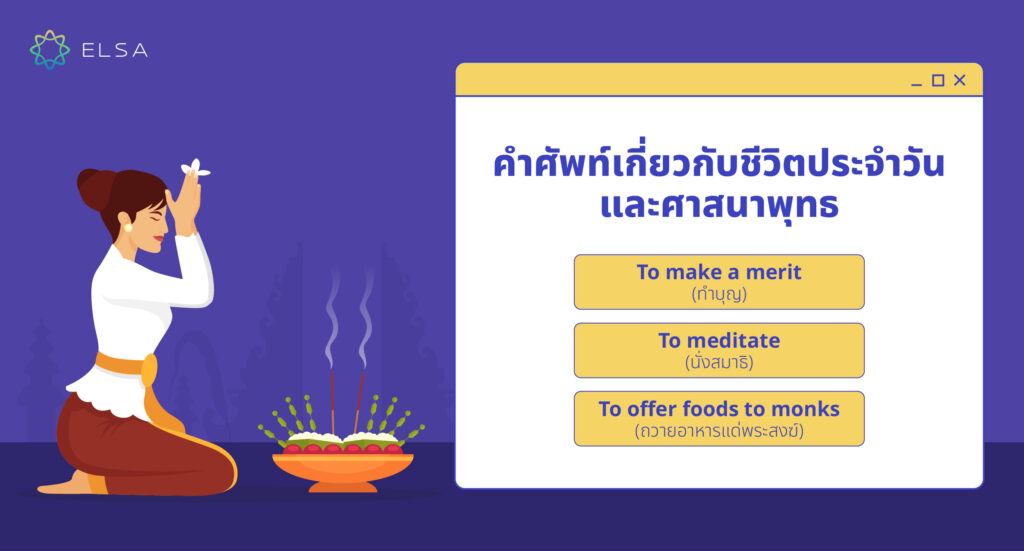
คำศัพท์เกี่ยวกับสิ่งของในวัดและพุทธศาสนา
| คำศัพท์ | การสะกดคำ | ความหมาย | ตัวอย่าง |
| Temple | /ˈtɛmpəl/ | วัด | The temple is a place for worship. (วัดเป็นสถานที่สำหรับการสักการะบูชา) |
| The Buddha Image | /ðə ˈbʊdə ˈɪmɪdʒ/ | พระพุทธรูป | Visitors often take photos with the Buddha image. (นักท่องเที่ยวมักถ่ายภาพกับพระพุทธรูป) |
| Relics | /ˈrɛlɪks/ | พระบรมสารีริกธาตุ | The temple houses many ancient relics. (วัดมีพระบรมสารีริกธาตุโบราณจำนวนมาก) |
| Buddha’s footprint | /ˈbʊdəz ˈfʊtprɪnt/ | รอยพระพุทธบาท | Pilgrims visit the site of Buddha’s footprint. (ผู้แสวงบุญมาเยี่ยมชมรอยพระพุทธบาท) |
| Pagoda | /pəˈɡoʊdə/ | เจดีย์ | The pagoda is beautifully designed and attracts tourists. (เจดีย์ถูกออกแบบอย่างสวยงามและดึงดูดนักท่องเที่ยว) |
| Chapel | /ˈtʃæpəl/ | โบสถ์ | A small chapel is located behind the main temple. (โบสถ์เล็ก ๆ ตั้งอยู่ด้านหลังวัด) |
| Pavilion at a temple | /pəˈvɪljən æt ə ˈtɛmpəl/ | ศาลาในวัด | The pavilion at the temple provides a peaceful resting place. (ศาลาในวัดเป็นสถานที่พักผ่อนที่สงบเงียบ) |
| Incense stick | /ˈɪnˌsɛns stɪk/ | ธูป | People light incense sticks during prayers. (ผู้คนจุดธูปในระหว่างการสวดมนต์) |
| Incense Burner | /ˈɪnˌsɛns ˈbɜrnər/ | กระถางธูป | The incense burner filled the air with a fragrant smell. (กระถางธูปส่งกลิ่นหอมฟุ้งไปทั่ว) |
| Candle | /ˈkændl/ | เทียน | They lit a candle for good luck. (พวกเขาจุดเทียนเพื่อขอโชคลาภ) |
| Lent candle | /lɛnt ˈkændl/ | เทียนพรรษา | The lent candle symbolizes penance. (เทียนพรรษาเป็นสัญลักษณ์แห่งการปลงอาบัติ) |
| Holy Water | /ˈhoʊli ˈwɔtər/ | น้ำมนต์ | Holy water is used for blessings. (น้ำมนต์ถูกใช้สำหรับการให้พร) |
| Sacred Cord | /ˈseɪkrɪd kɔrd/ | สายสิญจน์ | The sacred cord is tied during the ceremony. สายสิญจน์ถูกผูกในพิธีกรรม) |
| The yellow robe | /ðə ˈjɛloʊ ˈroʊb/ | ผ้ากาสาวพัสตร์ | Monks wear the yellow robe as a symbol of their faith. (พระสงฆ์สวมใส่ผ้ากาสาวพัสตร์เป็นสัญลักษณ์แห่งศรัทธา) |
| Offering | /ˈɔfərɪŋ/ | การถวาย | They made an offering of fruits and flowers. (พวกเขาถวายผลไม้และดอกไม้) |
| Cloth for the rains | /klɔθ fɔr ðə reɪnz/ | ผ้าอาบน้ำฝน | The cloth for the rains is used during the rainy season. (ผ้าอาบน้ำฝนมักจะใช้ในช่วงฤดูฝน) |
| Alms bowl | /ɑmz boʊl/ | บาตร | The monk carries an alms bowl to collect food. (พระสงฆ์ถือบาตรเพื่อรับอาหาร) |
| Lotus Flower | /ˈloʊtəs ˈflaʊər/ | ดอกบัว | The lotus flower is a symbol of purity in Buddhism. (ดอกบัวเป็นสัญลักษณ์ของความบริสุทธิ์ในพุทธศาสนา) |
| Jasmine Flower | /ˈdʒæzmin ˈflaʊər/ | ดอกมะลิ | Jasmine flowers are often used in religious offerings. (ดอกมะลิมักใช้ในเครื่องบูชาทางศาสนา) |
| Monk | /mʌŋk/ | พระสงฆ์ | The monk meditates in silence. (พระสงฆ์ทำสมาธิอย่างสงบ) |
| The Abbot | /ði ˈæbət/ | เจ้าอาวาส | The abbot oversees the temples activities. (เจ้าอาวาสดูแลกิจกรรมในวัด) |
| Novice | /ˈnɑvɪs/ | สามเณร | The novice learns the teachings of Buddhism. (สามเณรเรียนรู้คำสอนของพุทธศาสนา) |
| Temple Boy | /ˈtɛmpəl bɔɪ/ | เด็กวัด | The temple boy assists the monks with daily tasks. (เด็กวัดช่วยพระสงฆ์ทำกิจวัตรประจำวัน) |
| take food (of a monk) | /teɪk fuːd (ʌv ə mʌŋk)/ | รับอาหารจากพระ | It is customary to take food from a monk as a blessing. (การรับอาหารจากพระถือเป็นการรับพร) |
| The Avici Hell | /ðə əˈviːtʃi hɛl/ | นรกอเวจี | The Avici Hell is considered the lowest level of hell. (นรกอเวจีถือว่าเป็นระดับที่ต่ำที่สุดของนรก) |
| A place of happiness | /ə pleɪs ʌv ˈhæpɪnəs/ | สถานที่แห่งความสุข | The temple is often described as a place of happiness. (วัดมักถูกเรียกว่าเป็นสถานที่แห่งความสุข) |
| Releasing birds | /rɪˈlisɪŋ bɜrdz/ | ปล่อยนก | Releasing birds is a common practice for good karma. (การปล่อยนกเป็นธรรมเนียมปฏิบัติที่ดี) |
| Releasing fish | /rɪˈlisɪŋ fɪʃ/ | ปล่อยปลา | Many people believe that releasing fish brings peace. (หลายคนเชื่อว่าการปล่อยปลานำมาซึ่งความสงบสุข) |
| Releasing turtles | /rɪˈlisɪŋ ˈtɜrtəlz/ | ปล่อยเต่า | The act of releasing turtles symbolizes freedom. (การปล่อยเต่าหมายถึงการให้เสรีภาพ) |
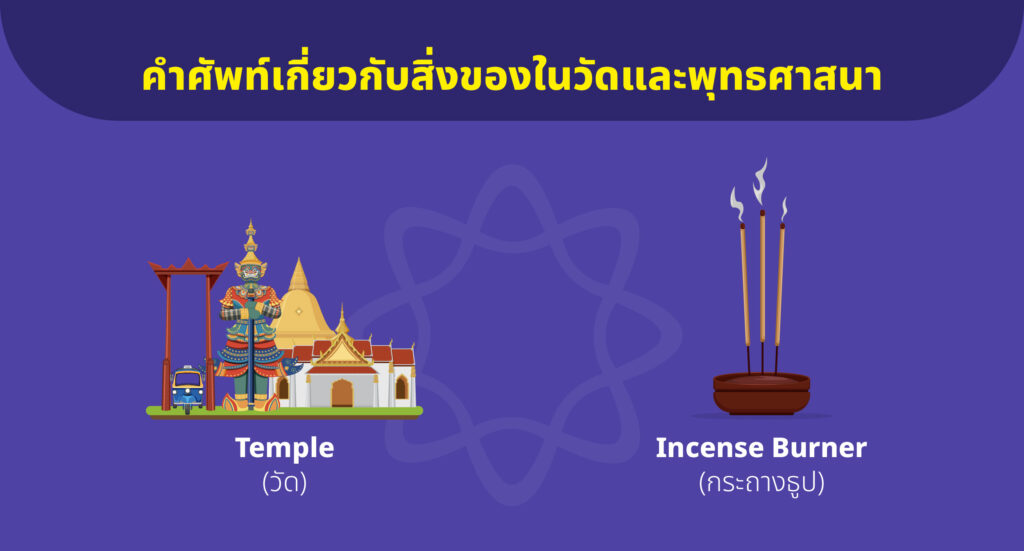
คำศัพท์ภาษาอังกฤษเกี่ยวกับวันสำคัญในพุทธศาสนา
| คำศัพท์ | การสะกดคำ | ความหมาย | ตัวอย่าง |
| Buddhist Holy Day | /ˈbʊdɪst ˈhoʊli deɪ/ | วันสำคัญทางพุทธศาสนา | Buddhist Holy Day is celebrated annually. (วันสำคัญทางพุทธศาสนาจะมีการจัดขึ้นทุกปี) |
| Vesakha Bucha Day | /veɪˈsɑːkə ˈbʊtʃə deɪ/ | วันระลึกถึงการประสูติ ตรัสรู้ และปรินิพพานของพระพุทธเจ้า | We celebrate Vesakha Bucha Day with prayers. (เราทำการสวดมนต์ในวันวิสาขบูชา) |
| Asarnha Bucha Day | /əˈsɑːrnhə ˈbʊtʃə deɪ/ | วันระลึกถึงปฐมเทศนาของพระพุทธเจ้า | On Asarnha Bucha Day, many attend temple services. (เนื่องในวันอาสาฬหบูชา หลายๆ คนไปทำบุญที่วัด) |
| Buddhist Lent Day | /ˈbʊdɪst lɛnt deɪ/ | วันเริ่มต้นของการถือศีลในช่วงเข้าพรรษา | Buddhist Lent Day marks a time of reflection. (วันเข้าพรรษาเป็นช่วงเวลาแห่งการคิดไตร่ตรอง) |
| End of Buddhist Lent Day | /ɛnd əv ˈbʊdɪst lɛnt deɪ/ | วันสิ้นสุดการถือศีลในช่วงเข้าพรรษา มักมีการจัดเทศกาล | The End of Buddhist Lent Day is celebrated with feasts. (วันออกพรรษามักมีการเฉลิมฉลอง) |
| Atthami Bucha Day | /ˈæθəmi ˈbʊtʃə deɪ/ | วันระลึกถึงพระพุทธเจ้าและพระอาจารย์ | On Atthami Bucha Day, people make offerings. (เนื่องในวันอัตตมีบุชา ผู้คนจะถวายเครื่องสักการะ) |
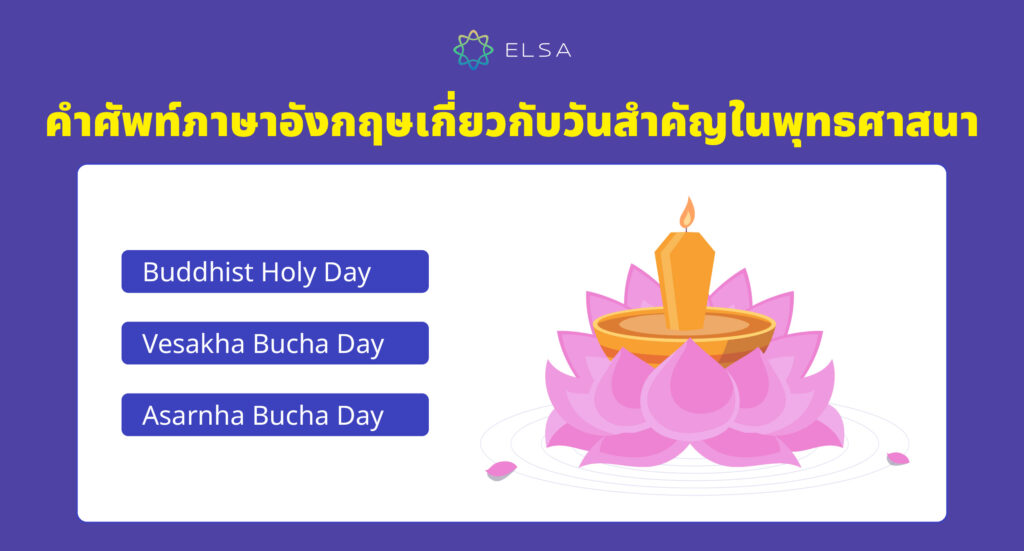
10 คำสอนของพระพุทธเจ้าเป็นภาษาอังกฤษ
| คำสอน | ความหมาย |
| The greatest pity in life is self-belittlement. | ความน่าสงสารที่สุดในชีวิตคือการดูถูกตัวเอง |
| The greatest ignorance in life is deceit. | ความโง่เขลาที่ใหญ่ที่สุดในชีวิตคือการหลอกลวง |
| The greatest error in life is to lose oneself. | ความผิดพลาดที่ใหญ่ที่สุดในชีวิตคือการหลงลืมตัวตน |
| The greatest enemy in life is the self. | ศัตรูที่ใหญ่ที่สุดในชีวิตคือ “ตัวเราเอง” |
| The greatest wealth in life is health and wisdom. | ทรัพย์สมบัติที่ใหญ่ที่สุดในชีวิตคือสุขภาพและปัญญา |
| The greatest pride in life is recovering from failures. | ความภาคภูมิใจที่ยิ่งใหญ่ที่สุดในชีวิตคือการลุกขึ้นหลังจากความล้มเหลว |
| The greatest failure in life is vanity. | ความล้มเหลวที่ใหญ่ที่สุดในชีวิตคือความหลงตัวเอง |
| The greatest crime in life is disloyalty to parents. | อาชญากรรมที่ใหญ่ที่สุดในชีวิตคือการอกตัญญูกับพ่อแม่ |
| The greatest bankruptcy in life is hopelessness. | การล้มละลายที่ใหญ่ที่สุดในชีวิตคือการสิ้นหวัง |
| The greatest tragedy in life is jealousy. | ความเศร้าที่ใหญ่ที่สุดในชีวิตคือความอิจฉาริษยา |

>>> Read more: ลากิจ ภาษาอังกฤษ ที่พบบ่อยที่สุดในทุกกรณี
คำถามที่เกี่ยวข้อง
ไหว้พระ ภาษาอังกฤษ
การไหว้พระภาษาอังกฤษเรียกว่า Offering to Buddha หรือ Worshipping Buddha ขึ้นอยู่กับบริบท
ฉันไปไหว้พระ ภาษาอังกฤษ
สามารถแปลได้ว่า:
- I go to make offerings to Buddha.
- I go to worship Buddha.
ใส่บาตร ภาษาอังกฤษ
การใส่บาตรภาษาอังกฤษเรียกว่า Offering food to Buddha หรือ Presenting food to the monks
บาตรพระ ภาษาอังกฤษ
สามารถแปลได้ว่า:
- Monks alms bowl.
- The alms bowl of the Buddhist monks.
สวดมนต์ นั่งสมาธิ ภาษาอังกฤษ
- Praying และ meditating.
- Practicing prayer และ meditation.
ทําบุญตักบาตร ภาษาอังกฤษ
สามารถแปลได้ว่า:
- Making merit by offering food.
- Performing good deeds by presenting meals.
เข้าวัดทําบุญ ภาษาอังกฤษ
- Going to the temple to make merit.
- Visiting the temple for good deeds.
ใส่บาตรตอนเช้า ภาษาอังกฤษ
- Offering food in the morning.
- Presenting meals during the morning ceremony.
ไหว้พระขอพร ภาษาอังกฤษ
- Offering to Buddha และ praying.
- Making offerings และ saying prayers.
ทําบุญเลี้ยงพระ ภาษาอังกฤษ
- Making merit by offering meals to the monks.
- Performing good deeds by hosting monks for a meal.
ฉันไปทำบุญ ภาษาอังกฤษ
- I go to make merit.
- I go to perform good deeds.
สวดมนต์ ภาษาอังกฤษใช้คำว่าอะไร
Praying หรือ Prayer
ฉันชอบทําบุญ ภาษาอังกฤษ
- I enjoy making merit.
- I like performing good deeds.
ทําบุญอุทิศส่วนกุศล ภาษาอังกฤษ
- Making merit and offering for blessings.
- Performing good deeds and dedicating to virtue.
เข้าวัดทําบุญ ภาษาอังกฤษ
Visiting the temple to make merit.
งานทําบุญ ภาษาอังกฤษ
- Merit-making activities.
- Good deeds work.
เป็นเพียงวิธีการทำบุญ
Just a way to make merit.
การทำบุญภาษาอังกฤษคืออะไร? หวังว่าหลังจากบทความนี้ คุณจะมีคลังคำศัพท์เกี่ยวกับพระพุทธศาสนามากขึ้นและสามารถใช้คำศัพท์เหล่านี้ได้อย่างถูกต้องและเหมาะสม หากคุณต้องการพัฒนาทักษะการพูดภาษาอังกฤษ อย่าลืมลองใช้ ELSA Speak แอปพลิเคชันที่ช่วยปรับปรุงการออกเสียงและทักษะการสื่อสารของคุณอย่างมีประสิทธิภาพกันนะ
รับทราบ ภาษาอังกฤษ เป็นวลีที่มักใช้ในการสื่อสารทางธุรกิจ โดยเฉพาะอย่างยิ่งเมื่อจำเป็นต้องยืนยันว่าคุณได้รับทราบและพร้อมที่จะดำเนินการต่อไป มาสำรวจวิธีการใช้วลีรับทราบในภาษาอังกฤษอย่างละเอียดเกี่ยวกับสถานการณ์ในชีวิตจริง และข้อผิดพลาดที่ควรหลีกเลี่ยงในการสื่อสารภาษาอังกฤษกับ ELSA Speak กันดีกว่า!
รับทราบ ภาษาอังกฤษคืออะไร?
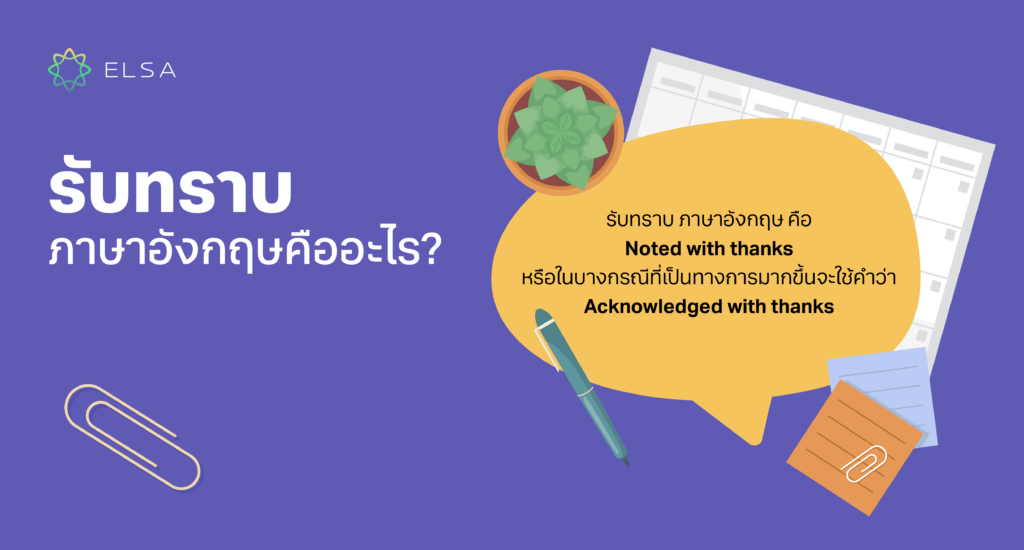
รับทราบ ภาษาอังกฤษ คือ Noted with thanks หรือในบางกรณีที่เป็นทางการมากขึ้นจะใช้คำว่า Acknowledged with thanks วลีเหล่านี้มักใช้เพื่อ:
- ยืนยันว่าคุณได้รับทราบข้อมูลแล้ว
- แสดงให้เห็นถึงความเป็นมืออาชีพและความสุภาพในการสื่อสาร
- แสดงให้เห็นว่าคุณพร้อมที่จะดำเนินการต่อไปได้

ตัวอย่างการยืนยันรับทราบในภาษาอังกฤษ
ก่อนที่จะลงรายละเอียด เรามาดูสถานการณ์จริงบางอย่างที่ที่ใช้วลีการยืนยันรับทราบในภาษาอังกฤษผ่านตารางด้านล่างนี้ :
| สถานการณ์จริง | วลีภาษาอังกฤษ | ความหมาย |
| รับรายงานจากเพื่อนร่วมงาน | Noted with thanks. | ได้รับทราบและขอบคุณ |
| ยืนยันการรับเอกสารสำคัญ | Acknowledged with thanks. | ยืนยันรับทราบพร้อมขอบคุณ |
| ยอมรับคำสั่งจากผู้บังคับบัญชา | Duly noted. | รับทราบและได้รับข้อมูลครบถ้วน |
| ตอบสนองต่อการแจ้งเตือนจากพันธมิตร | Your message is acknowledged. | เรารับทราบข้อความของคุณแล้ว |
| ยืนยันอีเมล์แจ้งกำหนดการทำงาน | Received and noted. | ได้รับแล้วและรับทราบแล้ว |
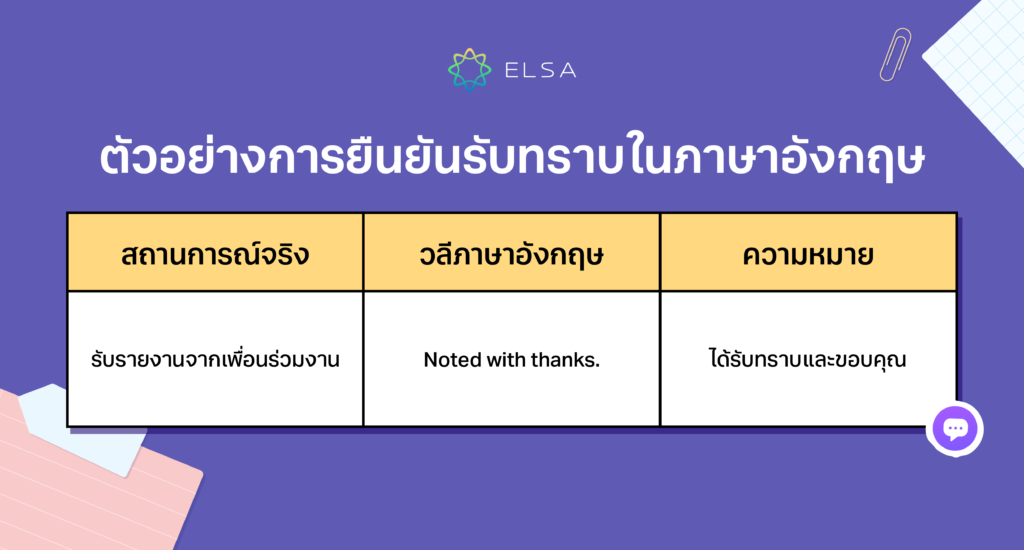
วลีทางเลือกสำหรับการรับทราบเป็นภาษาอังกฤษ
นอกจากวลีพื้นฐาน เช่น Noted with thanks คุณยังสามารถใช้สำนวนอื่นๆ เพื่อให้เหมาะกับแต่ละบริบทได้ดียิ่งขึ้น:
| สถานการณ์จริง | วลีทางเลือก | ความหมาย |
| เมื่อจำเป็นต้องมีการยืนยัน ว่าจะดำเนินการอย่างรวดเร็ว | Duly noted. I’ve added it to the meeting agenda for Friday. | รับทราบและได้รับข้อมูลครบถ้วน และฉันได้เพิ่มเรื่องนี้ลงในวาระการประชุมวันศุกร์แล้ว |
| เมื่อยืนยันข้อมูลในลักษณะที่เป็นทางการ | I will make a note of that. | ฉันจะจดบันทึกไว้ |
| เมื่อยืนยันข้อมูลอย่างเป็นกลางและเป็นมืออาชีพ | Message received. | ได้รับข้อความแล้ว |
| เมื่อยืนยันข้อมูลที่ไม่เป็นทางการ | Understood. | เข้าใจแล้ว |
| Got it, thanks. | เข้าใจแล้ว ขอบคุณ | |
| Copy that. I will inform the passengers immediately. | รับทราบแล้ว จะแจ้งให้ผู้โดยสารทราบทันที | |
| เมื่อยืนยันรับทราบพร้อมขอบคุณ | I appreciate the heads-up. | ฉันขอขอบคุณที่แจ้งให้ทราบ |
| เมื่อเสนอแนะสั้น ๆ และเป็นมืออาชีพ | Received and noted. | ได้รับแล้วและรับทราบแล้ว |
| เมื่อคุณต้องการเพิ่มความเชื่อมั่นมากขึ้น | Your instructions have been noted, and we will take action accordingly. | เราได้บันทึกคำแนะนำของคุณไว้แล้ว และจะดำเนินการตามนั้น |
| เมื่อเน้นลำดับความสำคัญ | Your message has been received and marked for priority action. | เราได้รับข้อความของคุณแล้วและทำเครื่องหมายว่าต้องดำเนินการตามลำดับความสำคัญ |
| เมื่อคุณต้องการเน้นย้ำความสนใจหรือเกี่ยวข้องกับการกระทำในอนาคต | I’ll make sure to keep this in mind. | ฉันจะจำเรื่องนี้ไว้อย่างแน่นอน |
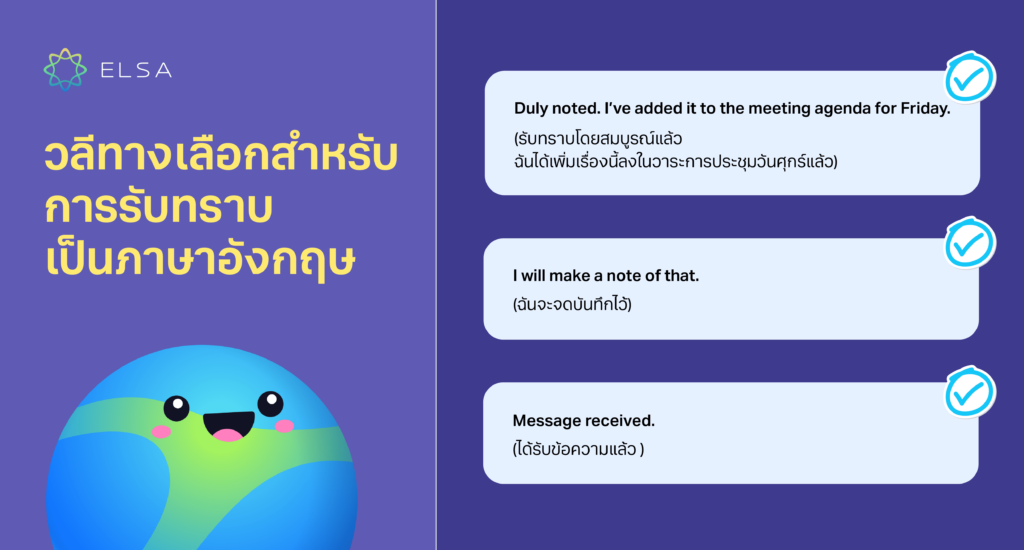
วิธีตอบกลับอีเมลเพื่อยืนยันการรับทราบเป็นภาษาอังกฤษในที่ทำงาน
หากต้องการใช้วลีนี้อย่างมีประสิทธิภาพในการตอบอีเมลหรือการสื่อสารในชีวิตประจำวัน โปรดคำนึงถึงหลักเกณฑ์ต่อไปนี้:
เลือกวลีที่เหมาะสมกับบริบท
- ในการสื่อสารอย่างเป็นทางการ: Acknowledged with thanks. – (แจ้งว่าได้รับทราบและแสดงความขอบคุณ)
- ในการสื่อสารที่รวดเร็ว: Noted with thanks. – (แจ้งว่าได้รับทราบข้อมูลและบันทึกข้อมูลแล้ว)
รวมเข้ากับการกระทำเพิ่มเติม
ตัวอย่าง:
- Noted with thanks. I will review the slides and provide feedback by the end of the day. – ( รับทราบแล้ว ขอบคุณค่ะ/ครับ ฉันจะตรวจสอบสไลด์และให้คำแนะนำภายในวันนี้)
- Acknowledged with thanks. I am available and will attend the session as scheduled. – (ยืนยันรับทราบและขอบคุณ ฉันพร้อมและจะเข้าร่วมการประชุมตามกำหนดการ)
นี่เป็นวิธีการยืนยันและแสดงให้เห็นว่าคุณจะดำเนินการตามข้อมูลต่อไป
>>> Read more: วิธีเขียนอีเมลภาษาอังกฤษแบบมืออาชีพและเหมาะสำหรับทุกสถานการณ์
หลีกเลี่ยงการตอบสั้นเกินไป
การตอบสั้นๆ เช่น Noted หรือ OK อาจทำให้รู้สึกว่าคุณไม่สนใจหรือไม่มีความสุภาพ เพิ่มคำตอบของคุณเพื่อแสดงให้เห็นถึงความเป็นมืออาชีพและทัศนคติเชิงบวกอย่างชัดเจน
ตัวอย่าง: Thank you for your update. I will review the updated agenda and share my comments if. necessary. (ขอบคุณสำหรับการอัปเดต ฉันจะตรวจสอบวาระที่อัปเดตและแบ่งปันความคิดเห็นของฉันหากจำเป็น)
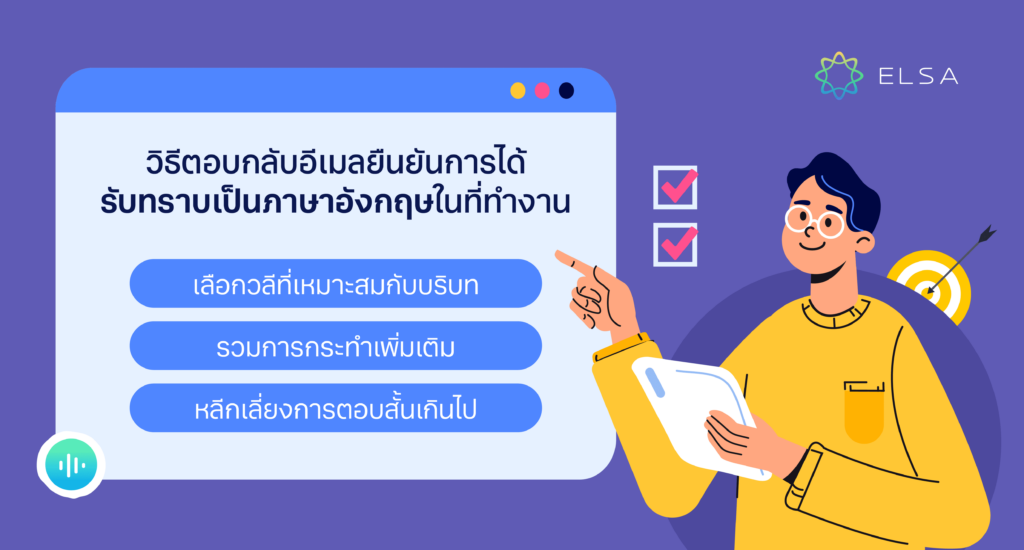
>>> Read more: 11 วิธีพูด Thank you – ขอบคุณภาษาอังกฤษที่สมบูรณ์ที่สุด
ข้อผิดพลาดที่ควรหลีกเลี่ยงเมื่อใช้วลีรับทราบข้อมูลเป็นภาษาอังกฤษ
การใช้ถ้อยคำที่ไม่เข้ากับบริบท
การใช้วลีที่ไม่ตรงกับระดับความเป็นทางการอาจทำให้ผู้รับสารเข้าใจเจตนาของคุณผิดหรือรู้สึกไม่สบายใจ
ตัวอย่าง การใช้ Duly noted ในการสนทนาที่ไม่เป็นทางการอาจทำให้ผู้รับรู้สึกเหินห่างได้ สามารถทดแทนด้วย Got it, thanks for letting me know! – (เข้าใจแล้ว ขอบคุณที่แจ้งให้ฉันทราบ)
คำตอบสั้นเกินไป
หลีกเลี่ยงการเขียนเพียง Noted คำเดียว เนื่องจากขาดความเป็นมืออาชีพและอาจทำให้เกิดความเข้าใจผิดได้
ขาดข้อมูลหรือแผนปฏิบัติการ
หากคุณยืนยันแต่ข้อมูลโดยไม่เสนอขั้นตอนถัดไปหรือข้อเสนอแนะที่เฉพาะเจาะจง ผู้รับอาจคิดว่าคุณไม่สนใจจริงๆ หรือไม่มีแผนในการดำเนินการ
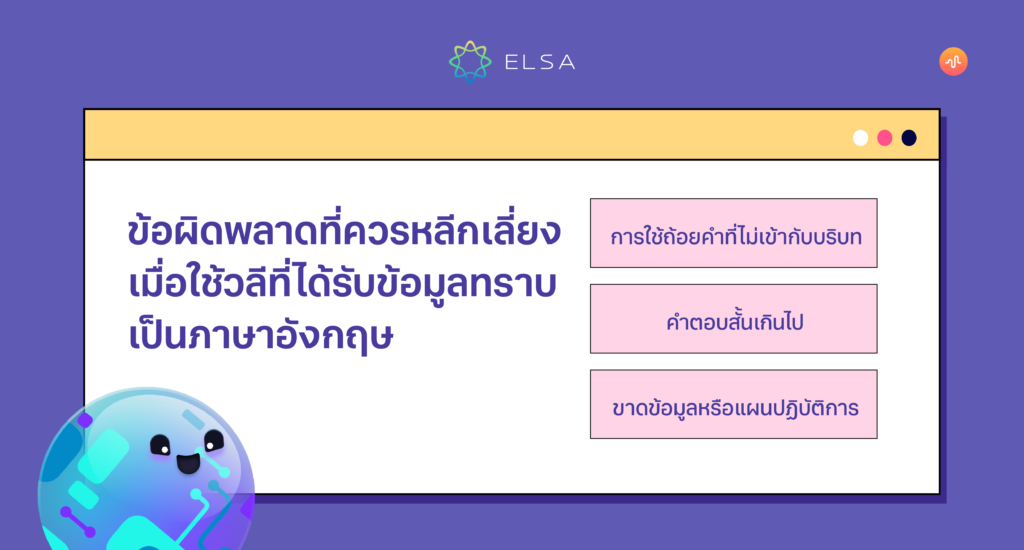
คำถามที่พบบ่อยเกี่ยวกับการรับทราบเป็นภาษาอังกฤษ
ความแตกต่างระหว่าง Noted และ acknowledge
- Noted: มักใช้เมื่อคุณต้องการยืนยันว่าได้รับทราบและบันทึกข้อมูลแล้ว
ตัวอย่าง: Noted with thanks. (รับทราบและขอบคุณ)
- Acknowledge: เป็นทางการมากขึ้น มักใช้เพื่อยืนยันการรับทราบอย่างสุภาพหรือเป็นทางการ
ตัวอย่าง: I would like to acknowledge receipt of your email. (ฉันต้องการยืนยันการได้รับอีเมลของคุณ)
| คุณเคยสงสัยว่า คํานําหน้าผู้หญิง ภาษาอังกฤษ คืออะไร และการใช้คำนำหน้าชื่อภาษาอังกฤษต่าง ๆ ให้ถูกต้องในบทสนทนาประจำวันควรใช้แบบไหน มาค้นคว้าจากบทความต่อไปนี้ |
ความแตกต่างระหว่าง Note และ noted
| Note | Noted | |
| ความแตกต่าง | เป็นคำกริยาหรือคำนาม หมายถึง จดบันทึกหรือให้ความสนใจ | เป็นรูปอดีตหรือกริยาช่องที่ 2 ของ note แปลว่า ได้รับทราบ ได้รับการบันทึก หรือมีชื่อเสียง |
| ตัวอย่าง | Please note the changes in the schedule. (โปรดทราบถึงการเปลี่ยนแปลงกำหนดการ) I made a note of his instructions. (ฉันได้จดบันทึกคำแนะนำของเขาไว้แล้ว) | Your concerns have been noted. (ข้อกังวลของคุณได้รับการรับทราบแล้ว) She is a noted author in the field. (เธอเป็นนักเขียนที่มีชื่อเสียงในสาขานี้) |

วิธีใช้ Noted
- ในการสื่อสารทางธุรกิจ: ใช้ Noted เมื่อคุณต้องการตอบกลับสั้นๆ และยืนยันว่าคุณได้รับทราบแล้ว
ตัวอย่าง:
Noted with thanks. (ได้รับทราบและขอบคุณ)
Received and noted. (รับทราบและจดบันทึกแล้ว)
- ในข้อความหรืออีเมลที่เป็นทางการมากขึ้น: ใช้ร่วมกับวลีอื่นๆ เพื่อแสดงความหมายและความรับผิดชอบอย่างชัดเจน
ตัวอย่าง: Your feedback has been noted, and we will address it accordingly. (เราได้บันทึกความคิดเห็นของคุณแล้ว และเราจะดำเนินการตามนั้น)
- เมื่อรวมกับคำมั่นสัญญาหรือการกระทำ:
ตัวอย่าง: Your suggestions have been noted and implemented. (ข้อเสนอแนะของคุณได้รับการบันทึกและนำไปปฏิบัติแล้ว)
Acknowledge จะใช้เมื่อใด?
- ในการสื่อสารอย่างเป็นทางการ: ใช้เพื่อยืนยันข้อมูลอย่างสุภาพและแสดงความเคารพ
ตัวอย่าง:
We acknowledge receipt of your payment. (เรารับทราบถึงการชำระเงินของคุณแล้ว)
I acknowledge the challenges you are facing. (ฉันรับทราบถึงความท้าทายที่คุณกำลังเผชิญ)
- ในเอกสารทางกฎหมายหรือเป็นทางการ:
ตัวอย่าง: I hereby acknowledge that I have read and understood the terms and conditions. (ฉันรับทราบว่าฉันได้อ่านและเข้าใจข้อกำหนดและเงื่อนไขทั้งหมดแล้ว)
- เมื่อคุณต้องการแสดงการอนุมัติหรือรับทราบการมีส่วนร่วมของผู้อื่น:
ตัวอย่าง: I want to acknowledge the efforts of the entire team. (ผมอยากชื่นชมความพยายามของทั้งทีม)
รับทราบ ภาษาอังกฤษ ไม่เพียงแต่เป็นวิธีการยืนยันเท่านั้น แต่ยังช่วยให้คุณแสดงความเป็นมืออาชีพและจิตวิญญาณเกี่ยวกับความร่วมมือในการสื่อสาร การทำความเข้าใจและใช้วลีนี้อย่างถูกต้องจะช่วยสร้างความสัมพันธ์ที่มีประสิทธิภาพมากขึ้นในการทำงานและชีวิตประจำวัน หากคุณต้องการพัฒนาความสามารถในการสื่อสารภาษาอังกฤษอย่างมั่นใจและมีประสิทธิภาพ ให้ ELSA Speak เดินทางไปกับคุณในการเดินทางครั้งนี้นะคะ!
คำถาม ตม. เป็นหัวข้อที่ทุกคนที่มีแผนจะเดินทางไปต่างประเทศควรให้ความสำคัญ ตั้งแต่วัตถุประสงค์ของการเดินทาง ระยะเวลาที่พักอาศัย ไปจนถึงข้อมูลส่วนบุคคล แต่ละประเทศจะมีข้อกำหนดที่แตกต่างกัน มาร่วมเรียนรู้กับ ELSA Speak เกี่ยวกับคำถามที่พบบ่อย วิธีการตอบคำถาม และเคล็ดลับการเตรียมตัวเพื่อให้การเดินทางของคุณราบรื่นยิ่งขึ้น
การเข้าเมืองคืออะไร?
การเข้าเมืองคือกระบวนการที่บุคคลหรือกลุ่มคนย้ายถิ่นฐานจากประเทศหนึ่งไปยังอีกประเทศหนึ่ง โดยมีจุดประสงค์เพื่ออยู่อาศัยระยะยาวหรือชั่วคราว การเข้าเมืองมักเกี่ยวข้องกับการแสวงหาโอกาสการทำงาน การศึกษา หรือการปรับปรุงคุณภาพชีวิต ซึ่งอาจส่งผลต่อเศรษฐกิจ วัฒนธรรม และสังคมของทั้งผู้ย้ายถิ่นฐานและประเทศที่รับพวกเขาเข้าไป
คำถาม ตม. ที่พบบ่อย

| คำถาม ตม. | คำแนะนำในการตอบ | ตัวอย่างคำตอบ |
| Passport, please. (กรุณาแสดงหนังสือเดินทาง) | เตรียมหนังสือเดินทางให้พร้อม | Here is my passport. (นี่คือหนังสือเดินทางของฉัน) |
| Can I see your passport, please? (ฉันขอดูหนังสือเดินทางของคุณได้ไหม?) | ส่งหนังสือเดินทางด้วยความมั่นใจ | Sure, here it is. (ใช่ นี่คือหนังสือเดินทางของฉัน) |
| Could you give me your passport, please? (คุณช่วยส่งหนังสือเดินทางให้ฉันได้ไหม?) | ตอบกลับอย่างสุภาพ | Yes, of course. (ได้ค่ะ แน่นอน) |
| Can I have your name? (ฉันขอทราบชื่อของคุณได้ไหม?) | บอกชื่อเต็มออกเสียงชัดเจน | My name is [your full name] (ฉันชื่อ [ชื่อเต็มของคุณ]) |
| Name, please. (กรุณาบอกชื่อค่ะ/ครับ) | ตอบกลับอย่างรวดเร็วและชัดเจน | [Your name] ([ชื่อของคุณ]) |
| What brings you here? (อะไรคือเหตุผลที่คุณมาที่นี่?) | อธิบายวัตถุประสงค์ของการเดินทาง | I am here for tourism/business/family visit. (ฉันมาที่นี่เพื่อท่องเที่ยว/ธุรกิจ/เยี่ยมครอบครัว) |
| Is this your first time here? นี่เป็นครั้งแรกของคุณที่มาที่นี่หรือเปล่า?) | ซื่อสัตย์เกี่ยวกับประวัติการเดินทางของคุณ | Yes, this is my first time. / No, I visited before. (ใช่ นี่เป็นครั้งแรกของฉัน/ไม่ ฉันเคยมาแล้ว) |
| Where are you from? (คุณมาจากที่ไหน?) | พูดเกี่ยวกับประเทศหรือเมืองของคุณ | I am from [your country/city]. (ฉันมาจาก [ประเทศ/เมืองของคุณ]) |
| Where have you flown from? (คุณบินมาจากที่ไหน?) | บอกสถานที่ที่คุณบินมาจาก | I have flown from [departure location]. (ฉันบินมาจาก [สถานที่ต้นทาง]) |
| What’s your occupation? (คุณทำงานอะไร?) | ให้ข้อมูลเกี่ยวกับอาชีพของคุณ | I am a [your occupation]. (ฉันเป็น [อาชีพของคุณ]) |
| What do you do for a living? (คุณทำงานอะไร?) | อธิบายงานของคุณอย่างละเอียด | I work as a [your job]. (ฉันทำงานเป็น [ตำแหน่งงานของคุณ]) |
| Do you have anything to declare? (คุณมีอะไรที่ต้องสำแดงหรือไม่?) | ซื่อสัตย์เกี่ยวกับสิ่งของที่คุณนำมา | No, I have nothing to declare. (ไม่ ฉันไม่มีอะไรต้องสำแดง) |
| How much money do you have with you? (คุณพกเงินมาด้วยเท่าไหร่?) | บอกจำนวนเงินที่คุณพกติดตัวมา | I have [amount of money] in cash. (ฉันมีเงินสด [จำนวนเงิน]) |
| How long will you be staying in ? (คุณจะอยู่ใน [ประเทศ] นานแค่ไหน?) | บอกระยะเวลาที่คุณจะอยู่ | I will stay for [duration]. (ฉันจะอยู่เป็นเวลา [ระยะเวลา]) |
| When will you return to your home country? (คุณจะกลับประเทศของคุณเมื่อไหร่?) | บอกวันที่คุณจะกลับประเทศของคุณ | I will return on [date]. (ฉันจะกลับในวันที่ [วันที่]) |
| When are you going back home? (คุณจะกลับบ้านเมื่อไหร่?) | ตอบวันที่คุณจะกลับบ้าน | I will go back on [date]. (ฉันจะกลับในวันที่ [วันที่]) |
| How many days are you planning to be here? (คุณวางแผนจะอยู่ที่นี่กี่วัน?) | บอกจำนวนวันที่คุณจะพักอาศัย | I plan to stay for [number of days] days. (ฉันวางแผนที่จะอยู่ [จำนวนวัน] วัน) |
| Show me your return ticket, please. (กรุณาแสดงตั๋วขากลับ) | เตรียมตั๋วเครื่องบินขากลับให้พร้อม | Here is my return ticket. (นี่คือตั๋วขากลับของฉัน) |
| Who are you traveling with? (คุณเดินทางมากับใคร?) | บอกว่าเดินทางกับใคร | I am traveling with [spouse/family/friends]. (ฉันเดินทางกับ [คู่สมรส/ครอบครัว/เพื่อน]) |
| Are you traveling alone? (คุณเดินทางมาคนเดียวหรือเปล่า?) | ยืนยันหากคุณเดินทางคนเดียว | Yes, I am traveling alone. (ใช่ ฉันเดินทางคนเดียว) |
| Where will you be visiting? (คุณจะไปเที่ยวที่ไหนบ้าง?) | บอกสถานที่ที่คุณวางแผนจะไปเยี่ยมชม | I plan to visit [places]. (ฉันวางแผนจะไปที่ [สถานที่]) |
| What are you studying? (คุณกำลังเรียนอะไรอยู่?) | บอกเกี่ยวกับหลักสูตรหรือโรงเรียนของคุณ | I am studying [subject/course] at [school/university]. (ฉันกำลังเรียน [วิชา/หลักสูตร] ที่ [โรงเรียน]) |
| Where is your school? (โรงเรียนของคุณอยู่ที่ไหน?) | บอกตำแหน่งที่ตั้งของโรงเรียนคุณ | My school is located in [city/area]. (โรงเรียนของฉันตั้งอยู่ที่ [เมือง/พื้นที่]) |
| Do you plan to work here? (คุณมีแผนจะทำงานที่นี่หรือเปล่า?) | ยืนยันเจตนาของคุณอย่างชัดเจน | No, I don’t plan to work here. (ไม่ ฉันไม่มีแผนที่จะทำงานที่นี่) |
| How much money are you bringing? (คุณนำเงินมาด้วยเท่าไหร่?) | บอกจำนวนเงินที่คุณนำมา | I am bringing [amount of money]. (ฉันนำเงินมา [จำนวนเงิน]) |
| What is the purpose of your visit? (วัตถุประสงค์ในการเดินทางของคุณคืออะไร?) | ตอบสั้น ๆ และตรงตามวัตถุประสงค์ของการเดินทาง | I am here for tourism/business/family visit. (ฉันมาที่นี่เพื่อการท่องเที่ยว/ธุรกิจ/เยี่ยมครอบครัว) |
| What is your name? (คุณชื่ออะไร?) | บอกชื่อเต็มของคุณ ออกเสียงให้ชัดเจน และสะกดชื่อหากจำเป็น | My name is [your full name]. (ชื่อของฉันคือ [ชื่อเต็มของคุณ]) |
| How long do you plan to stay? (คุณวางแผนจะอยู่ที่นี่นานแค่ไหน?) | บอกระยะเวลาให้ชัดเจน สอดคล้องกับตารางการเดินทางและตั๋ว | I will stay for [duration]. (ฉันจะพักอยู่เป็นเวลา [ระยะเวลา]) |
| Where will you be staying? (คุณจะพักที่ไหน?) | บอกสถานที่พักที่แน่นอน (โรงแรม Airbnb หรือที่อยู่ญาติ) | I will stay at [hotel/Airbnb/address]. (ฉันจะพักที่ [โรงแรม/Airbnb/ที่อยู่]) |
| Do you have a return ticket? (คุณมีตั๋วขากลับหรือเปล่า?) | เตรียมตั๋วหรือเอกสารยืนยันการเดินทางขากลับไว้ให้พร้อม | Yes, I have a return ticket on [date]. (ใช่ ฉันมีตั๋วเดินทางกลับในวันที่ [วันที่]) |
| Have you visited this country before? (คุณเคยมาเที่ยวประเทศนี้หรือเปล่า?) | ตอบตามความจริงเกี่ยวกับประวัติการเดินทางของคุณ | Yes, I visited last year for business. / No, this is my first time visiting. (ใช่ ฉันเคยมาที่นี่เมื่อปีที่แล้วเพื่อธุรกิจ / ไม่ นี่เป็นครั้งแรกที่ฉันมาที่นี่) |
| Do you have any illegal weapons with you? คุณมีอาวุธผิดกฎหมายติดตัวมาด้วยหรือเปล่า?) | อย่าตื่นตกใจ ตอบว่าไม่มีอย่างสุภาพ | No, I don’t have any weapons. (ไม่ ฉันไม่ได้พกอาวุธใด ๆ) |
| What do you do for work? คุณทำงานอะไร?) | ให้ข้อมูลที่ชัดเจนเกี่ยวกับอาชีพของคุณ | I am a [your occupation]. (ฉันเป็น [อาชีพของคุณ]) |
| Do you plan to work here? คุณมีแผนจะทำงานที่นี่หรือเปล่า?) | ยืนยันว่าคุณไม่มีแผนที่จะละเมิดเงื่อนไขของวีซ่า | No, I don’t plan to work here. (ไม่ ฉันไม่ได้วางแผนที่จะทำงานที่นี่) |
| Do you have sufficient funds for your trip? (คุณมีเงินเพียงพอสำหรับการเดินทางหรือเปล่า?) | เตรียมเอกสารแสดงสถานะการเงินของคุณให้พร้อมหากจำเป็น | Yes, I have sufficient funds in my bank account. (ใช่ ฉันมีเงินเพียงพอในบัญชีธนาคารของฉัน) |
| Who will you be traveling with? (คุณเดินทางมากับใคร?) | บอกว่าคุณเดินทางคนเดียวหรือกับกลุ่ม | I am traveling with [spouse/family/friends]. (ฉันเดินทางกับ [คู่สมรส/ครอบครัว/เพื่อน]) |
| Have you ever been refused a visa before? (คุณเคยถูกปฏิเสธการขอวีซ่ามาก่อนหรือเปล่า?) | ตอบตามความจริง ระบุเหตุผลหากเคยถูกปฏิเสธวีซ่า และวิธีที่คุณแก้ไขปัญหา | No, I have never been refused a visa. (ไม่ ฉันไม่เคยถูกปฏิเสธวีซ่ามาก่อน) |
| ในการตอบคำถาม ตม. เรามักต้องใช้ประโยคที่ถามถึงจำนวนหรือปริมาณอยู่บ่อย ๆ การเข้าใจหลักการใช้ how much how many จะช่วยให้คุณตอบได้อย่างมั่นใจมากขึ้น และสื่อสารกับเจ้าหน้าที่ได้อย่างราบรื่น |

บทสนทนา ตม. ภาษาอังกฤษ
ด้านล่างนี้คือบทสนทนา ตม. ภาษาอังกฤษเพื่อช่วยให้คุณมั่นใจมากขึ้นเมื่อเดินทางไปยังประเทศอื่น:
| ลำดับ | คำถามของเจ้าหน้าที่ศุลกากร | คำแปลภาษาไทย | วิธีการตอบ | ตัวอย่างบทสนทนา |
| 1 | Passport, please. | กรุณายื่นหนังสือเดินทาง | Here you go. There you are. | A: Passport, please. B: Here you go. A: Thank you. Let me see. |
| Can I see your passport, please? | ขอดูหนังสือเดินทางของคุณ | |||
| Could you give me your passport, please? | กรุณาส่งหนังสือเดินทางให้ฉัน | |||
| 2 | Can I have your name? | ขอทราบชื่อของคุณ | My name is [ชื่อของคุณ]. | A: Can I have your name, please? B: My name is Susan Drake. |
| Name, please. | กรุณาบอกชื่อ | |||
| 3 | What’s the purpose of your visit? | วัตถุประสงค์ของการเดินทางมาที่นี่คืออะไร? | I’m on vacation. I’m here to travel. | A: What’s the purpose of your visit? B: I’m on vacation. |
| What brings you here? | คุณมาที่นี่เพราะอะไร? | I’m here to continue my study. I’m here on business. | A: What brings you here? B: I’m here to visit my family. A: Where does your family live? B: They are living in Tokyo. | |
| 4 | Is this your first time here? | นี่เป็นครั้งแรกของคุณที่มาที่นี่หรือเปล่า? | Yes, it is my first time. No, it is my second time. | A: Is this your first time here? B: Yes, it is my first time. |
| 5 | Are you here alone? | คุณมาคนเดียวใช่ไหม? | Yes, I’m traveling here alone. No, I’m with my friends. | A: Are you here alone? B: No, I’m with my friends. |
| 6 | Where are you from? | คุณมาจากที่ไหน? | I’m from [ประเทศ/สถานที่ที่คุณอาศัยอยู่]. | A: Where are you from? B: I’m from Vietnam. |
| Where have you flown from? | คุณบินมาจากที่ไหน? | |||
| 7 | What’s your occupation? | อาชีพของคุณคืออะไร? | I’m a [อาชีพ]. | A: What’s your occupation? B: I’m a teacher. |
| What’s your job? | งานของคุณคืออะไร? | |||
| What do you do for a living? | คุณทำงานอะไร? | |||
| 8 | Where will you be staying? | คุณจะพักที่ไหน? | I’ll be staying at [สถานที่พักอาศัย]. | A: Where will you be staying? B: I’ll be staying at the Hilton Hotel. |
| 9 | Do you have anything to declare? | คุณมีอะไรต้องสำแดงหรือเปล่า? | I have some [สิ่งของ]. No, I have nothing to declare. | A: Do you have anything to declare? B: Yes, I have some dried fruit with me. A: Show me, please. |
| 10 | How much money do you have with you? | คุณมีเงินติดตัวเท่าไร? | I have [จำนวนเงินและสกุลเงิน] with me. | A: How much money do you have with you? B: I have 7,500 US dollars with me. |
| 11 | How long will you be staying in [country]? | คุณจะอยู่ใน [ประเทศ] นานเท่าไร? | [จำนวนวัน/สัปดาห์/เดือน] | A: How long will you be staying in the United States? B: 3 weeks. |
| 12 | When will you return to your home country? | คุณจะกลับประเทศของคุณเมื่อไร? | I’ll be returning home on [วันที่]. | A: When will you return to your home country? B: On the 3rd of April 2023. |
| When are you going back home? | คุณจะกลับบ้านเมื่อไร? | A: When are you going back home? B: I’m going back to my country on the 11th of December. |

สิ่งที่ต้องเตรียมเมื่อเดินทางไปต่างประเทศ
การเตรียมตัวอย่างรอบคอบก่อนเดินทางไปต่างประเทศไม่เพียงช่วยให้การเดินทางของคุณราบรื่นขึ้น แต่ยังช่วยเพิ่มความปลอดภัยและลดค่าใช้จ่ายได้อีกด้วย ด้านล่างนี้คือสิ่งที่คุณควรใส่ใจเพื่อให้การเดินทางของคุณราบรื่น:
- กระเป๋าสัมภาระ
- หนังสือเดินทาง (Passport) ที่มีอายุการใช้งานเหลืออย่างน้อย 6 เดือน พร้อมวีซ่าของประเทศปลายทาง
- ตั๋วเครื่องบินแบบไป-กลับ (ทั้งขาไปและขากลับ)
- หลักฐานการจองที่พักหรือข้อมูลรายละเอียดเกี่ยวกับที่พัก
- แผนการเดินทาง โดยเฉพาะถ้าคุณมีแผนจะเดินทางไปยังหลายเมืองหรือหลายรัฐ (ถ้ามี)
- แบบฟอร์มขอเข้าเมืองที่กรอกข้อมูลครบถ้วนและถูกต้อง

ไม่สามารถพูดภาษาอังกฤษได้ ฉันควรทำอย่างไรเพื่อผ่านขั้นตอนการตรวจคนเข้าเมือง?
หากคุณไม่สามารถพูดภาษาอังกฤษได้ดี หรือไม่สามารถสื่อสารกับเจ้าหน้าที่ ตม ภาษาอังกฤษได้ ไม่ต้องกังวล คุณยังสามารถผ่านขั้นตอนการตรวจคนเข้าเมืองได้หากคุณกรอกข้อมูลในแบบฟอร์มขอเข้าเมืองอย่างครบถ้วนและถูกต้อง โดยให้แน่ใจว่าคุณระบุข้อมูลสำคัญ เช่น ชื่อ-นามสกุล หมายเลขหนังสือเดินทาง เหตุผลในการเดินทาง ที่พัก จำนวนเงินที่นำติดตัว และแผนการเดินทางโดยละเอียด หากคุณกรอกข้อมูลได้ครบถ้วนมากกว่า 85% โอกาสที่จะผ่านด่านตรวจคนเข้าเมืองจะสูงขึ้นมาก
นอกจากนี้ ในบางประเทศ เช่น เกาหลีใต้ ยังมีบริการแปลภาษาสำหรับผู้ที่ไม่สามารถพูดภาษาอังกฤษได้ คุณสามารถขอความช่วยเหลือเพื่อตอบคำถามเกี่ยวกับขั้นตอนการเข้าเมืองได้ ในกรณีที่เดินทางพร้อมครอบครัว หากไม่สามารถผ่านด่านตรวจคนเข้าเมืองพร้อมกันได้ ควรให้สมาชิกที่พูดภาษาอังกฤษได้เข้าไปก่อน และแจ้งเจ้าหน้าที่ว่า คุณเดินทางมาพร้อมสมาชิกในครอบครัวที่ไม่พูดภาษาอังกฤษ เช่น “She is my mother, and she does not speak English” (เธอเป็นแม่ของฉัน และเธอไม่สามารถพูดภาษาอังกฤษได้) วิธีนี้จะช่วยให้การตรวจคนเข้าเมืองเป็นไปอย่างราบรื่น

การเข้าใจ คำถาม ตม. และการเตรียมตัวอย่างรอบคอบก่อนการเดินทาง ไม่เพียงช่วยให้คุณผ่านขั้นตอนตรวจคนเข้าเมืองได้อย่างรวดเร็ว แต่ยังลดความเครียดลงได้อีกด้วย โดยเฉพาะอย่างยิ่ง หากคุณกังวลเกี่ยวกับอุปสรรคทางภาษา แอปพลิเคชัน ELSA Speak จะเป็นเครื่องมือที่มีประโยชน์ ช่วยพัฒนาทักษะการสื่อสารภาษาอังกฤษของคุณ และเพิ่มความมั่นใจในการตอบคำถามของเจ้าหน้าที่ศุลกากร เริ่มต้นฝึกฝนตั้งแต่วันนี้เพื่อให้การเดินทางของคุณราบรื่นและง่ายดายยิ่งขึ้น!
All เป็นคำที่คุ้นเคยในภาษาอังกฤษ แต่คุณเข้าใจว่า all คืออะไรและใช้อย่างไรหรือยัง? คำนี้ไม่เพียงแค่มีความหมายที่หลากหลายเท่านั้น แต่ยังมีความยืดหยุ่นในด้านไวยากรณ์อีกด้วย ทำให้เกิดความสับสนแก่ผู้เรียนจำนวนมาก มาเรียนรู้ความหมายและตัวอย่างการใช้ all พร้อมแบบฝึกหัดกับ ELSA Speak กันเลย
All ในภาษาอังกฤษคืออะไร?
ตามพจนานุกรมของ Cambridge คำว่า All คือ: every one (of), or the complete amount or number (of), or the whole (of) สามารถแปลได้ว่า: ทั้งหมดหรือทั้งกลุ่ม ชุด หรือจำนวนใดๆ
แนวคิดนี้เน้นความครอบคลุมอย่างสมบูรณ์โดยไม่ทิ้งองค์ประกอบใดๆไว้นอกขอบเขตที่เป็นปัญหา คำว่า all สามารถทำหน้าที่เป็นคำสรรพนามหรือคำวิเศษณ์ในประโยคได้ ซึ่งจะเพิ่มความยืดหยุ่นเมื่อใช้คำในบริบทต่างๆ
>>> Read more: Everyday กับ Every day: คำจำกัดความ ความแตกต่าง และแบบฝึกหัด
บทบาทของ all ในการทำหน้าเป็นตัวกำหนดคำสรรพนามที่ใช้แทนคำนาม
ในฐานะที่เป็นตัวกำหนด all มักใช้เพื่อเน้นทั้งหมดหรือทั้งกลุ่ม
ตัวอย่าง:
- All children love to play. (เด็กทุกคนชอบที่จะเล่น)
- All the employees attended the meeting. (พนักงานทุกคนเข้าร่วมการประชุม)
- All the seats in the hall were occupied. (เก้าอี้ในห้องประชุมทั้งหมดถูกนั่งเต็มแล้ว)
บทบาทของ all ในการทำหน้าที่เป็นคำสรรพนาม
All สามารถใช้แทนกลุ่มหรือชุดที่ได้ถูกกล่าวถึงก่อนหน้านี้
ตัวอย่าง:
- All are welcome to join the event. (ยินดีต้อนรับทุกท่านเข้าร่วมงานอีเว้นท์)
- That’s all she told me. (นั่นคือทั้งหมดที่เธอพูดกับฉัน)
- All was calm after the storm. (ทุกอย่างสงบลงหลังจากเกิดพายุ)
บทบาทของ all ในการทำหน้าที่เป็นคำวิเศษณ์
ในฐานะที่เป็นคำวิเศษณ์ all มักใช้เพื่อเน้นความสมบูรณ์หรือความครบถ้วน
ตัวอย่าง:
- She was all alone in the house. (เธออยู่คนเดียวในบ้าน)
- The team played all out in the final match. (ทีมเล่นกันอย่างเต็มที่ในนัดสุดท้าย)
- He was all excited about the news. (เขาตื่นเต้นกับข่าวนี้มาก)

การใช้ all ในวลีที่มีคำกริยาและคำบุพบท
All เป็นคำที่ยืดหยุ่นในภาษาอังกฤษ จึงสามารถใช้ร่วมกับคำกริยาและคำบุพบทได้หลายคำ เพื่อสร้างวลีที่มีความหมายต่างกัน การทำความเข้าใจวิธีใช้จะช่วยให้คุณแสดงออกได้อย่างถูกต้องและเป็นธรรมชาติมากขึ้นในการสื่อสาร
วิธีใช้ All กับคำกริยา
All สามารถใช้ร่วมกับคำกริยาเพื่อเน้นความครอบคลุมหรือการกระทำของกลุ่มวิชาได้ ตำแหน่ง all ในประโยคขึ้นอยู่กับการเน้นของผู้พูด โดยสามารถอยู่หน้ากริยาช่วย กริยาหลัก หรือคำนามได้ การใช้ตำแหน่งที่ถูกต้องของ all ช่วยให้ประโยคมีความสอดคล้องและแม่นยำมากขึ้น
ด้านล่างนี้คือตรางสรุปของวิธีการใช้ all กับคำกริยาพร้อมตัวอย่างประกอบ
| ตำแหน่งของ all | ความหมาย | ตัวอย่าง |
| อยู่ก่อนคำกริยาช่วยและคำกริยา V. to be หรือหลังคำกริยาปกติ | เน้นย้ำถึงทุกส่วนของประธานที่มีส่วนร่วมในกิจกรรม | All อยู่หลังคำกริยาช่วยและกริยา V. to be (is/am/are/was/were)We can all swim.(พวกเราทุกคนว่ายน้ำเป็น)Those apples were all bad.(แอปเปิ้ลทั้งหมดนั้นเน่าแล้ว)The guests have all arrived.(แขกทั้งหมดมาถึงแล้ว) |
| All วางอยู่หน้าคำกริยาอื่น ๆMy family all work in education.(สมาชิกในครอบครัวของฉันทุกคนทำงานในภาคการศึกษา)They all liked the soup.(พวกเขาทุกคนชอบเมนูซุปนั้น) | ||
| อยู่ก่อนคำนาม | แสดงถึงสิ่งของทั้งหมดที่ถูกกล่าวถึง | All the answers are correct.(คำตอบทั้งหมดถูกต้อง) |
| All the windows are open. (หน้าต่างทั้งหมดเปิดอยู่) | ||
| All these problems must be solved soon.(ปัญหาทั้งหมดเหล่านี้ต้องได้รับการแก้ไขโดยเร็ว) |
All ในวลีกับคำบุพบท

คำว่า All เมื่อรวมกับคำบุพบทจะสร้างเป็นวลีหลายแบบที่มีความหมายหลากหลาย ซึ่งมักใช้เพื่ออธิบายขอบเขต ความครอบคลุม หรือเน้นย้ำการกระทำหรือเหตุการณ์ต่าง ๆ การเข้าใจการใช้วลีเหล่านี้อย่างถูกต้องจะช่วยให้การสื่อสารของคุณราบรื่นขึ้น และเพิ่มความแม่นยำในการใช้ภาษาอังกฤษ
ด้านล่างนี้คือวลีต่างๆที่ใช้ all ร่วมกับคำบุพบท รวมถึงคำอธิบายความหมาย ตัวอย่างการใช้ และความหมายภาษาไทยเพื่อให้คุณสามารถจำและนำไปใช้ในชีวิตจริงได้ง่ายขึ้น
| วลี | ความหมาย | ตัวอย่าง |
| All of | แสดงถึงทั้งหมดของกลุ่มหรือชุดหนึ่ง | All of the students are here. (นักเรียนทั้งหมดมาที่นี่แล้ว) All of his efforts paid off. (ความพยายามทั้งหมดของเขาเป็นผลสำเร็จ) |
| All over | ทั่วทุกแห่ง | There was snow all over the ground. (มีหิมะทั่วพื้นดิน) They searched all over the city for the missing dog. (พวกเขาค้นหาสุนัขที่หายไปทั่วทั้งเมือง) |
| All around | รอบ ๆ หรือ ทั่วทุกที่ | Flowers bloom all around the garden. (ดอกไม้บานรอบ ๆ สวน) There are people all around us. (มีคนอยู่รอบตัวเรา) |
| All along | ตั้งแต่ต้นจนจบ (ตลอด) | He knew all along that it was a bad idea. (เขารู้มาตลอดว่าเป็นความคิดที่ไม่ดี) All along the road, there were beautiful trees. (ตลอดทางเดินมีต้นไม้สวยงามอยู่เต็มไปหมด) |
| All through | ตลอดระยะเวลาหนึ่ง | He worked hard all through the night. (เขาทำงานอย่างหนักตลอดทั้งคืน) They stayed calm all through the chaos. (พวกเขายังคงสงบสติอารมณ์ตลอดความวุ่นวาย) |
| All up | ทั้งหมด | It was all up to him to make the final decision. (ทั้งหมดขึ้นอยู่กับเขาว่าจะตัดสินใจอย่างไร) The situation is all up to you now. (สถานการณ์ทั้งหมดขึ้นอยู่กับคุณตอนนี้) |
| All about | ทั้งหมดเกี่ยวกับ, เพียงมุ่งเน้นไปที่ | The story is all about friendship and loyalty. (เรื่องราวทั้งหมดเกี่ยวกับมิตรภาพและความภักดี) He’s all about helping others. (เขาทุ่มเทให้กับการช่วยเหลือผู้อื่น) |
| All for | เราสนับสนุนอย่างเต็มที่ หรือคาดหวังเกี่ยวกับ… | She’s all for taking a vacation. (เธอเห็นด้วยอย่างเต็มที่กับการไปพักร้อน) He’s all for making changes to improve the system. (เขาเห็นด้วยอย่างเต็มที่กับการทำการเปลี่ยนแปลงเพื่อปรับปรุงระบบ) |

แบบฝึกหัด: เข้าใจและใช้ all อย่างถูกต้อง
ทำแบบฝึกหัดด้านล่างนี้เพื่อทดสอบและเสริมความรู้เกี่ยวกับวิธีใช้ all และวลีที่เกี่ยวข้องกับคำนี้
หัวข้อ: เลือกคำตอบที่ถูกต้องในคำถามต่อไปนี้
- ____ the team members attended the meeting.
a. all
b. whole - The ____ day was spent traveling.
a. all
b. whole - They looked ____ the place but couldn’t find the document.
a. all of
b. all over - ____ the books on the shelf belong to her.
a. all
b. whole - He completed the project on time, and that’s ____ we wanted.
a. all
b. whole - She’s done ____ of the assignments given to her.
a. all
b. whole - The children ate ____ the pizza by themselves.
a. all of
b. whole - ____ the windows in the house were cleaned yesterday.
a. all of
b. all - they were tired, but they kept walking ____ the journey.
a. all through
b. all over - The meeting lasted ____ the morning and went very well.
a. all through
b. all over
คำตอบและคำอธิบาย
| ข้อที่ | คำตอบ | คำอธิบาย |
| 1 | a. all | All the team members สมาชิกในทีมทุกคน |
| 2 | b. whole | The whole day เป็นวิธีการพูดที่ถูกต้องเมื่อกล่าวถึงวันทั้งวัน |
| 3 | b. all over | All over the place แปลว่า “ทุกที่” |
| 4 | a. all | All the books ใช้เพื่อพูดถึงหนังสือทุกเล่ม |
| 5 | a. all | All we wanted หมายถึงทั้งหมดที่เราต้องการ |
| 6 | a. all | All of the assignments ใช้เมื่อพูดถึงการบ้านทั้งหมด |
| 7 | a. all of | All of the pizza ใช้เมื่อพูดถึงการกินพิซซ่าทั้งหมด |
| 8 | b. all | All the windows เป็นการใช้ที่ถูกต้องเพื่อกล่าวถึงการทำความสะอาดหน้าต่างทั้งหมด |
| 9 | a. all through | All through the journey หมายถึงตลอดการเดินทาง |
| 10 | a. all through | All through the morning เน้นถึงการดำเนินการต่อเนื่องในช่วงเช้าช่วงเช้า |
คำที่มีความหมายเหมือนและตรงข้ามกับ all ในภาษาอังกฤษ
ตามพจนานุกรมของเคมบริดจ์ all มีคำพ้องความหมายและคำตรงข้ามที่แตกต่างกันมากมาย ขึ้นอยู่กับบทบาทของคำในประโยค (คำคุณศัพท์หรือคำวิเศษณ์)
คำพ้องความหมายและคำตรงข้ามเมื่อ All ใช้เป็นคำคุณศัพท์
เมื่อ all เป็นคำคุณศัพท์ แปลว่า ทั้งหมดหรือประกอบทุกส่วน
| คำพ้องความหมาย | คำอธิบาย | ตัวอย่าง |
| Every | เน้นการรวมแต่ละองค์ประกอบเข้าในกลุ่ม | Every student must attend the meeting. (นักเรียนทุกคนต้องเข้าร่วมการประชุม) |
| Entire/Whole | แสดงออกถึงความสมบูรณ์และครบถ้วน | She spent the entire day reading. (เธอใช้เวลาทั้งวันในการอ่านหนังสือ)The whole town celebrated the festival. (คนทั้งเมืองเฉลิมฉลองเทศกาลนี้) |
| Complete | แปลว่า สมบูรณ์, ไม่ขาดส่วนใดส่วนหนึ่ง | He ate the complete cake. (เขากินเค้กทั้งหมด) |
| Total | เน้นจำนวนหรือปริมาณทั้งหมด | The total cost is $50. (ค่าใช้จ่ายทั้งหมดคือ $50) |
ด้านล่างนี้เป็นตัวอย่างคำตรงข้ามพร้อมคำอธิบายและตัวอย่าง
| คำตรงข้าม | คำอธิบาย | ตัวอย่าง |
| None | การปฏิเสธโดยสมบูรณ์ไม่มีความหมายอะไรเลย | None of the students were present. (ไม่มีนักเรียนคนใดที่มาที่นี่) |
| Some | เป็นเพียงบางส่วนหรือจำนวนหนึ่งเท่านั้น ซึ่งตรงข้ามกับความสมบูรณ์ของ all | Some people agree, but not all. (บางคนเห็นด้วย แต่ไม่ใช่ทั้งหมด) |
| Few | เน้นถึงจำนวนที่น้อยมาก ไม่เพียงพอที่จะครอบคลุม | Few of them came. (มีคนน้อยที่มาที่นี่) |
คำพ้องความหมายและคำตรงข้ามเมื่อ All ใช้เป็นคำวิเศษณ์
เมื่อ all เป็นคำวิเศษณ์ แปลว่า สมบูรณ์ หรือเท่าๆ กัน
ด้านล่างนี้เป็นตัวอย่างคำพ้องความหมายของ all เมื่อเป็นคำวิเศษณ์ พร้อมคำอธิบายและตัวอย่าง
| คำพ้องความหมาย | คำอธิบาย | ตัวอย่าง (แปล) |
| Completely | แสดงถึงความครอบคลุมทั้งหมด | He was completely alone. (เขาอยู่คนเดียวโดยสิ้นเชิง) |
| Totally | ทั้งหมด | She was totally ready for the trip. (เธอพร้อมเต็มที่สำหรับการเดินทาง) |
| Entirely | แปลว่า สมบูรณ์ ไม่ละส่วน | They were entirely covered in mud. (พวกเขาเปรอะเปื้อนไปด้วยโคลนทั้งตัว) |
ด้านล่างนี้เป็นตัวอย่างคำตรงข้ามของ all เมื่อเป็นคำวิเศษณ์ พร้อมคำอธิบายและตัวอย่าง
| คำตรงข้าม | คำอธิบาย | ตัวอย่าง |
| Partially | เพียงส่วนหนึ่ง ไม่ใช่ทั้งหมด | The work is partially done. (งานเสร็จแค่บางส่วน) |
| Incompletely | อย่างไม่สมบูรณ์ | The task was done incompletely.(งานเสร็จไม่สมบูรณ์) |
คำที่ลงท้ายด้วย all
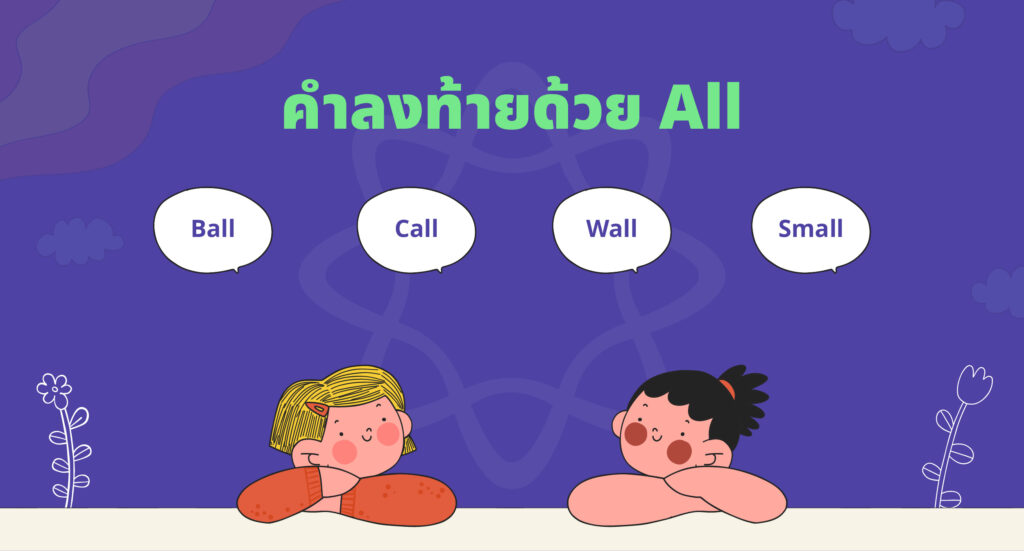
ในภาษาอังกฤษ มีคำหลายคำที่ลงท้ายด้วยคำ all ซึ่งมีความหมายที่หลากหลาย และมักใช้ในการสื่อสารในชีวิตประจำวันตลอดจนการเขียน คำเหล่านี้ไม่เพียงแต่ปรากฏในสถานการณ์ทั่วไปเท่านั้น แต่ยังนำไปใช้ในสาขาวิชาชีพ ศิลปะ และด้านเทคนิคอีกด้วย
| คำศัพท์ | ถอดเสียง | ตัวอย่าง |
| Ball | /bɔːl/ | The kids are playing with a ball. (เด็กๆ กำลังเล่นกับลูกบอล) |
| Call | /kɔːl/ | I’ll call you later. (ฉันจะโทรหาคุณในภายหลัง) |
| Wall | /wɔːl/ | He painted the wall blue. (เขาทาผนังเป็นสีฟ้า) |
| Small | /smɔːl/ | She lives in a small town. (เธออาศัยอยู่ในเมืองเล็กๆ) |
| Fall | /fɔːl/ | The leaves fall in autumn. (ใบไม้ร่วงในฤดูใบไม้ร่วง) |
| Mall | /mɔːl/ | Let’s go to the mall. (ไปห้างสรรพสินค้ากันเถอะ) |
| Hall | /hɔːl/ | The wedding took place in a large hall. (งานแต่งจัดขึ้นในห้องโถงใหญ่) |
| Install | /ɪnˈstɔːl/ | Can you install this software? (คุณสามารถติดตั้งซอฟต์แวร์นี้ได้หรือไม่?) |
| Overall | /ˌoʊvərˈɔːl/ | Overall, the trip was a success. (โดยรวมแล้วการเดินทางครั้งนี้ประสบผลสำเร็จ) |
| Recall | /rɪˈkɔːl/ | I can’t recall his name. (ฉันจำชื่อเขาไม่ได้) |
| Stall | /stɔːl/ | The car suddenly stalled. (รถก็หยุดกะทันหัน) |
| Tall | /tɔːl/ | He’s the tallest person in the room. (เขาเป็นคนที่สูงที่สุดในห้อง) |
| Installment | /ɪnˈstɔːlmənt/ | He paid the money in monthly installments. (เขาจ่ายเงินเป็นงวดๆ ทุกเดือน) |
| Appall | /əˈpɔːl/ | The horror movie will appall you. (ภาพยนตร์สยองขวัญจะทำให้คุณตกใจ) |
| Befall | /bɪˈfɔːl/ | No one knows what will befall us tomorrow. (ไม่มีใครรู้ว่าพรุ่งนี้จะเกิดอะไรขึ้นกับเรา) |
| Windfall | /ˈwɪndˌfɔːl/ | She received a windfall after her uncle passed away. (เธอได้รับเงินจำนวนหนึ่งที่ไม่คาดคิดหลังจากที่ลุงของเธอเสียชีวิต) |
| Downfall | /ˈdaʊnˌfɔːl/ | His arrogance led to his downfall. (ความหยิ่งยโสของเขานำไปสู่ความล้มเหลว) |
| Forestall | /fɔːrˈstɔːl/ | We must act now to forestall disaster. (เราต้องดำเนินการทันทีเพื่อป้องกันภัยพิบัติ) |
| Overcall | /ˌoʊvərˈkɔːl/ | In bridge, overcalling is a common strategy. (ในบริดจ์เรียกไพ่สูงเกินไปเป็นกลยุทธ์ทั่วไป) |
| Snowball | /ˈsnoʊˌbɔːl/ | The problem started small but quickly snowballed. (ปัญหาเริ่มต้นจากจุดเล็กๆ แต่ก็ระเบิดอย่างรวดเร็ว) |
| Installable | /ɪnˈstɔːləbl/ | The app is easily installable on all devices. (แอปพลิเคชั่นนี้ติดตั้งได้อย่างง่ายดายบนอุปกรณ์ทั้งหมด) |
| Fireball | /ˈfaɪərˌbɔːl/ | A fireball lit up the sky after the explosion. (ดาวตกส่องสว่างทั่วท้องฟ้าหลังจากการระเบิด) |
| Baseball | /ˈbeɪsˌbɔːl/ | Baseball is a popular sport in the USA. (เบสบอลเป็นกีฬายอดนิยมในอเมริกา) |
| Football | /ˈfʊtˌbɔːl/ | Football is the world’s most popular sport. (ฟุตบอลเป็นกีฬาที่ได้รับความนิยมมากที่สุดในโลก) |
| Handball | /ˈhændˌbɔːl/ | Handball requires both speed and strategy. (แฮนด์บอลต้องใช้ทั้งความเร็วและวิธีการ) |
| Catcall | /ˈkætˌkɔːl/ | The audience responded with catcalls of disapproval. (ผู้ชมมีปฏิกิริยาโห่ร้องด้วยความไม่เห็นด้วย) |
| Meatball | /ˈmiːtˌbɔːl/ | She made spaghetti with meatballs for dinner. (เธอทำสปาเก็ตตี้มีทบอลเป็นมื้อเย็น) |

แยกแยะระหว่างความหมายและการใช้คำว่า Whole และ All
แม้ว่าทั้ง all และ whole ทั้งสองคำนี้จะหมายความว่าทั้งหมด แต่ใช้ต่างกันในโครงสร้างประโยคและบริบท
ความแตกต่างระหว่าง all และ whole
| All | Whole |
| ใช้กับคำนามที่เป็นพหูพจน์หรือคำนามนับไม่ได้ | ใช้กับคำนามเอกพจน์ |
| เน้นย้ำแต่ละส่วนในภาพรวมทั้งหมด | เน้นย้ำถึงความสมบูรณ์แบบ ไม่ถูกแบ่งแยก |
| ตัวอย่าง: All the cookies were eaten. (คุกกี้ทั้งหมดถูกกินหมดแล้ว) | ตัวอย่าง: He ate the whole cookie. (เขากินคุกกี้ทั้งชิ้น) |
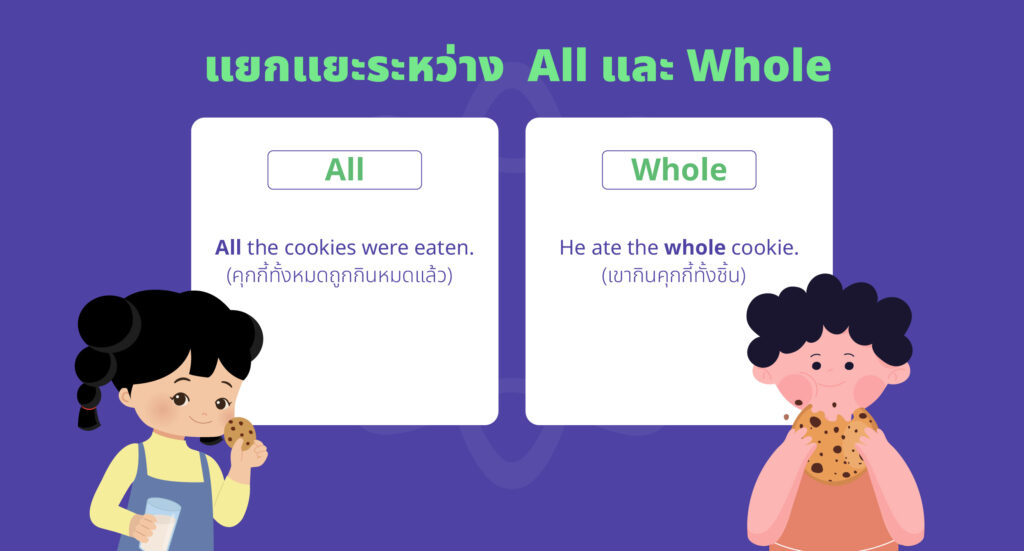
แบบฝึกหัด: แยกแยะ whole และ all
ทำแบบฝึกหัดด้านล่างเพื่อทดสอบและเสริมความรู้เกี่ยวกับวิธีแยกแยะความแตกต่างระหว่าง whole และ all
หัวข้อ: เลือกคำตอบที่ถูกต้องสำหรับคำถามต่อไปนี้
- He spent the ____ evening watching movies.
a. whole
b. all - ____ the students in the class passed the exam.
a. whole
b. all - I read the ____ book in just one night.
a. whole
b. all - ____ his life, he has been passionate about art.
a. all
b. whole - The thief stole ____ the money in the safe.
a. all
b. whole - The ____ family gathered for the reunion.
a. whole
b. all - She cleaned ____ the rooms in the house before the guests arrived.
a. whole
b. all - We explored the ____ island during our vacation.
a. whole
b. all - I couldn’t believe that ____ the tickets were sold out in just five minutes.
a. all
b. whole - The movie was so interesting that I watched it the ____ time without any breaks.
a. whole
b. all
คำตอบและคำอธิบาย
| คำถาม | คำตอบ | คำอธิบาย |
| 1 | a. whole | Whole evening ใช้เมื่อพูดถึงช่วงเวลาตลอดทั้งเย็น |
| 2 | b. all | All the students พูดถึงนักเรียนทั้งหมดในห้อง |
| 3 | a. whole | Whole book เหมาะสำหรับการพูดถึงการอ่านหนังสือทั้งเล่มจนจบ |
| 4 | a. all | All his life ใช้เมื่อพูดถึงตลอดชีวิตของเขา |
| 5 | a. all | All the money ใช้เพื่อกล่าวถึงจำนวนเงินทั้งหมด |
| 6 | a. whole | Whole family เหมาะสำหรับการเมื่อเน้นย้ำถึงสมาชิกทั้งหมดในครอบครัว |
| 7 | b. all | All the rooms เป็นการใช้ที่ถูกต้องเมื่อพูดถึงห้องทั้งหมด |
| 8 | a. whole | Whole island ใช้เมื่อกล่าวถึงเกาะทั้งหมด |
| 9 | a. all | All the tickets เน้นถึงตั๋วทั้งหมดที่ถูกขายหมดแล้ว |
| 10 | a. whole | The whole time ใช้เมื่อเน้นย้ำถึงช่วงเวลาทั้งหมดที่ดูหนังโดยไม่หยุดพัก |
คำถามที่พบบ่อย
ด้านล่างนี้เป็นคำถามทั่วไปเกี่ยวกับความหมายของวลีภาษาอังกฤษ ซึ่งจะช่วยให้คุณเข้าใจวิธีใช้ในการสื่อสารในชีวิตประจำวันได้ดีขึ้น
All in all คืออะไร?
ความหมาย: All in all หมายถึง โดยรวม หรือสุดท้าย มักใช้ในการสรุปหรือสรุปหลังจากพิจารณาปัจจัยทั้งหมดแล้ว
วิธีใช้: วลีนี้มักจะปรากฏที่ท้ายประโยคหรือเมื่อคุณต้องการสรุปทั่วไปเกี่ยวกับสถานการณ์บางอย่าง
ตัวอย่าง:
- All in all, it was a productive day at work. (โดยรวมแล้ว วันนี้เป็นวันที่ทำงานได้ผลดี)
- All in all, the trip was worth it despite the bad weather. (สุดท้าย การเดินทางคุ้มค่าแม้จะมีสภาพอากาศไม่ดี)
- All in all, the movie was entertaining, even if it was a bit long. (โดยรวมแล้ว ภาพยนตร์สนุกแม้จะค่อนข้างยาวไปหน่อย)
At all คืออะไร?
ความหมาย: at all แปลว่าอะไร? เป็นวลีเชิงลบที่ใช้เพื่อเน้นการไม่มีของบางสิ่งบางอย่าง ก็สามารถแปลได้ว่าครบถ้วน ไม่มีแม้แต่น้อย
วิธีใช้: ใช้ในประโยคปฏิเสธเป็นหลัก หรือเมื่อคุณต้องการเน้นว่าบางสิ่งไม่ได้เกิดขึ้น หรือไม่เกิดขึ้นเลย
ตัวอย่าง:
- I don’t like spicy food at all. (ฉันไม่ชอบอาหารเผ็ดเลยสักนิด)
- He didn’t seem interested at all in the conversation. (เขาดูเหมือนไม่สนใจการสนทนาเลยสักนิด)
- She wasn’t upset at all after the news. (เธอไม่รู้สึกเสียใจเลยหลังจากได้รับข่าว)
All เป็นคำสำคัญในภาษาอังกฤษที่ช่วยให้คุณแสดงความหมายของความครบถ้วนหรือครอบคลุมได้อย่างยืดหยุ่นและถูกต้อง อย่าลืมติดตามและเข้าชมบทความที่เป็นประโยชน์อีกมากมายของ ELSA Speak เพื่อพิชิตภาษาอังกฤษอย่างง่ายดายและมีประสิทธิภาพที่สุดนะ
ในภาษาอังกฤษ By the way มักใช้เพื่อแนะนำข้อมูลใหม่หรือหัวข้ออื่น โดยไม่เกี่ยวข้องโดยตรงกับการสนทนาในปัจจุบัน งั้น By the way แปลว่าอะไร? By the way การใช้ยังไง? มาดูรายละเอียดกับ ELSA Speak ในบทความด้านล่างกันนะ!
By the way แปลว่า?
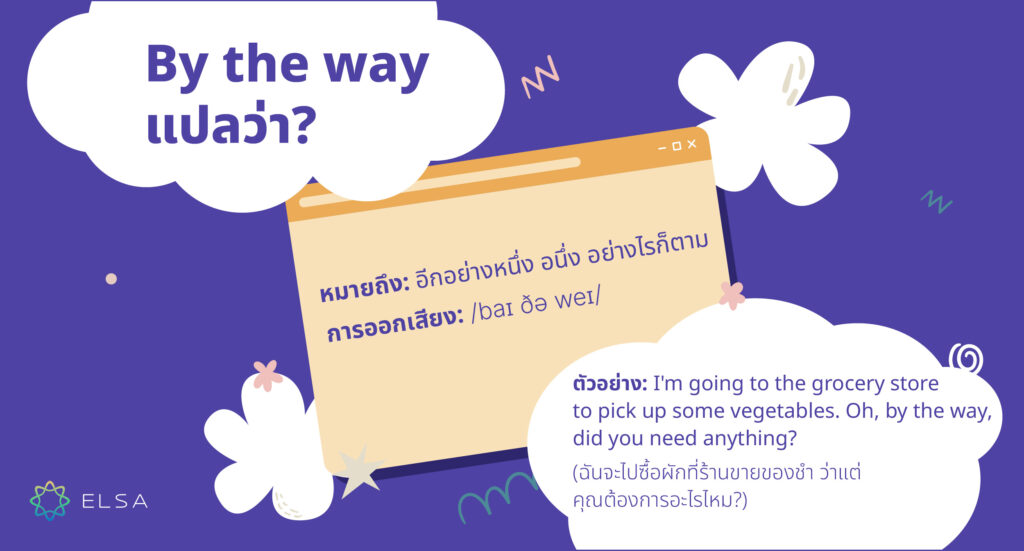
By the way สามารถแปลเป็นภาษาไทยได้ว่า อีกอย่างหนึ่ง อนึ่ง อย่างไรก็ตาม นี่เป็นวลีภาษาอังกฤษที่มักใช้เพื่อย้ายจากหัวข้อหรือความคิดเห็นหนึ่งไปยังอีกหัวข้อหนึ่งที่ไม่เกี่ยวข้องกับประเด็นที่กำลังถูกพูดถึง นอกจากนี้ By the way ยังสามารถนำไปใช้เสริมข้อมูลได้อีกด้วย
ตัวอย่าง:
- I’m going to the grocery store to pick up some vegetables. Oh, by the way, did you need anything? (ฉันจะไปซื้อผักที่ร้านขายของชำ ว่าแต่ คุณต้องการอะไรไหม?)
- We’re planning a trip to Europe next summer. By the way, have you ever been to Paris? (เราวางแผนที่จะไปเที่ยวยุโรปช่วงฤดูร้อนหน้าน่ะ ว่าแต่ คุณเคยไปปารีสมาหรือยัง?)
>>> Read more: By แปลว่าอะไร? แนะนำวิธีการใช้ by อย่างละเอียดเป็นภาษาอังกฤษ
วิธีการใช้ By the way ในภาษาอังกฤษ
| วิธีการใช้ By the way | ตัวอย่าง |
| ใช้เพื่อเปลี่ยนเรื่องในการสนทนา | We’re planning to go to the beach this weekend. By the way, have you finished reading that book I lent you? (สุดสัปดาห์นี้เราวางแผนจะไปเที่ยวทะเลกัน ว่าแต่ คุณอ่านหนังสือเล่มที่ฉันยืมคุณจบหรือยัง?) |
| เพิ่มข้อมูลในการสนทนา | I was at the mall earlier, and by the way, I bumped into Ploy. (ฉันเพิ่งไปที่ห้างสรรพสินค้ามา และบังเอิญไปเจอพลอยเข้า) |
| สร้างการเชื่อมโยงระหว่างสองแนวคิดในบริบท | We’re going to have spaghetti for dinner tonight. By the way, I bought some garlic bread to go with it. (คืนนี้เราจะทานสปาเก็ตตี้เป็นมื้อเย็นและฉันก็ซื้อขนมปังกระเทียมมาทานคู่กันด้วยนะ) |
| เตือนหรือพูดคุยเกี่ยวกับบางสิ่งที่เพิ่งนึกถึง | By the way, don’t forget to call your mom today. (ยังไง วันนี้ก็อย่าลืมโทรหาคุณแม่ของคุณด้วยนะ) |
| เมื่อคุณต้องการทำให้เรื่องหนัก ๆ ให้เป็นเรื่องเบาๆ | By the way, I noticed you haven’t submitted the report yet. Do you need any help with it? (ว่าแต่ ฉันสังเกตว่าคุณยังไม่ได้ส่งรายงานเลย คุณต้องการความช่วยเหลืออะไรไหม) |
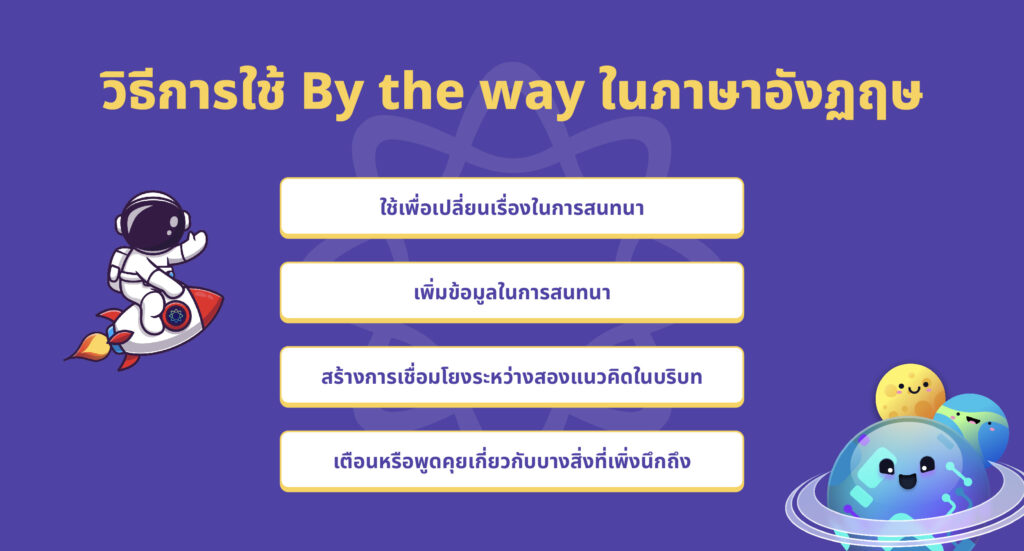
ตําแหน่งของ By the way ในประโยค
| ตําแหน่ง | ความหมาย | ตัวอย่าง |
| By the way อยู่หน้าประโยค | เพื่อเริ่มแนวคิดใหม่ มักใช้เมื่อคุณต้องการเปลี่ยนหัวข้อหรือให้ข้อมูลเพิ่มเติม | By the way, have you seen the latest movie in the series? (ว่าแต่คุณได้ดูหนังเรื่องล่าสุดของซีรีส์นี้ยัง?) |
| By the way อยู่กลางประโยค | ใช้เพื่อแทรกลงในประโยคพร้อมกับเพิ่มข้อมูลที่เกี่ยวข้อง | I was at the bookstore, by the way, and I found that book you recommended. (ฉันไปร้านหนังสือมาและพบหนังสือที่คุณแนะนำ) |
| By the way ท้ายประโยค | ใช้เพื่อเน้นข้อมูลเพิ่มเติมหรือเป็นคำเตือนที่สุภาพ | I borrowed your charger, by the way. (ฉันยืมที่ชาร์จของคุณมานะ) |
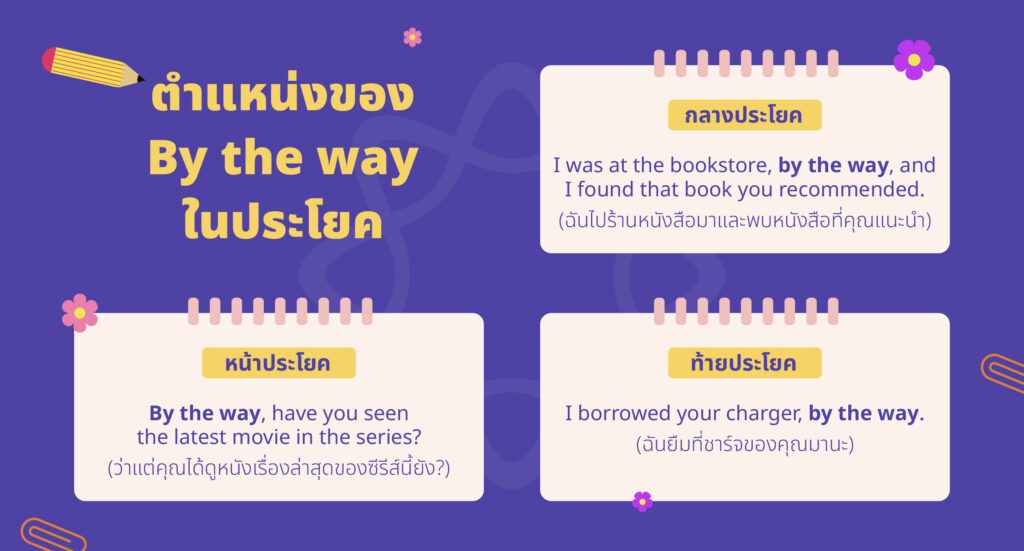
คําพ้องความหมายกับ By the way
| คําพ้องความหมาย | การออกเสียง | ความหมาย | ตัวอย่าง |
| Incidentally | /ˌɪn.sɪˈden.tl.i/ | ว่าแต่ | Incidentally, did you hear about the meeting tomorrow? (ว่าแต่คุณได้ยินเรื่องการประชุมพรุ่งนี้ไหม?) |
| Speaking of which | /ˈspiː.kɪŋ əv wɪtʃ/ | พูดถึงเรื่องนั้นแล้วก็…/ ว่าแต่ | Speaking of which, how is your new job going? (ว่าแต่งานใหม่ของคุณเป็นยังไงบ้าง?) |
| On a side note | /ɒn ə saɪd nəʊt/ | อีกอย่างหนึ่ง/ว่าแต่ | On a side note, I saw your brother yesterday. (ว่าแต่ ฉันเห็นพี่ชายของคุณเมื่อวานนี้) |
| While we’re at it | /waɪl wɪər ˈæt ɪt/ | ในขณะที่ | While we’re at it, let’s also discuss the budget. (ในขณะที่เรากำลังคุยกันอยู่ เรามาหารือเรื่องงบประมาณกันเถอะ) |
| As an aside | /æz ən əˈsaɪd/ | ไปด้านหนึ่ง ว่าแต่ | As an aside, he mentioned that he might move to another city. (ว่าแต่ เขายังบอกว่าเขาอาจจะย้ายไปเมืองอื่นด้วย) |
| Apropos | /ˌæp.rəˈpəʊ/ | อนึ่ง | Apropos our discussion earlier, I found this article you might like. (จากการสนทนาของเราก่อนหน้านี้ ฉันพบบทความนี้ที่คุณอาจสนใจ) |
| Just so you know | /dʒʌst səʊ juː ˈnəʊ/ | แค่อยากบอกให้รู้ไว้ | Just so you know, the meeting starts at 9 a.m. (แค่อยากบอกให้รู้ไว้ว่าการประชุมเริ่มเวลา 9.00 น.) |
| Incidentally speaking | /ˌɪn.sɪˈden.tl.i ˈspiː.kɪŋ/ | อีกประการหนึ่ง | Incidentally speaking, there’s a new café opening nearby. (อีกประการหนึ่งคือมีร้านกาแฟใหม่เปิดอยู่ใกล้ ๆ) |
| For your information (FYI) | /fɔːr jɔːr ˌɪn.fəˈmeɪ.ʃən/ | เพื่อบอกให้ทราบ | FYI, the report has already been sent to the manager. (แค่จะบอกให้ทราบว่ารายงานได้ถูกส่งไปยังผู้จัดการแล้ว) |
| By the by | /baɪ ðə baɪ/ | อนึ่ง อีกประการหนึ่ง อ้อ | Oh, by the by, don’t forget to bring your umbrella. (อ้อ อย่าลืมพกร่มไปด้วยนะ) |
| As it happens | /æz ɪt ˈhæp.ənz/ | บังเอิญ | As it happens, I saw your friend at the coffee shop this morning. (บังเอิญฉันเห็นเพื่อนของคุณที่ร้านกาแฟเมื่อเช้านี้) |
| Come to think of it | /kʌm tə ˈθɪŋk əv ɪt/ | พอมาคิด ๆ ดูแล้ว | Come to think of it, I saw your friend at the bookstore yesterday. (พอมาคิด ๆ ดูแล้ว เมื่อวานนี้ ฉันเห็นเพื่อนของคุณที่ร้านหนังสือ) |
| On that note | /ɒn ðæt nəʊt/ | ไหน ๆ ก็ว่ามาแล้ว | On that note, I think we should wrap up this meeting. (ไหน ๆ ก็ว่ามาแล้ว ฉันคิดว่าเราควรหยุดการประชุมครั้งนี้) |
| In passing | /ɪn ˈpɑː.sɪŋ/ | ก่อนจะผ่านไปพูดถีงเรื่องอื่น ว่าแต่ | In passing, I wanted to mention that I’ll be out of town next week. (ว่าแต่ฉันอยากจะบอกว่าฉันจะไม่อยู่เมืองในสัปดาห์หน้า) |
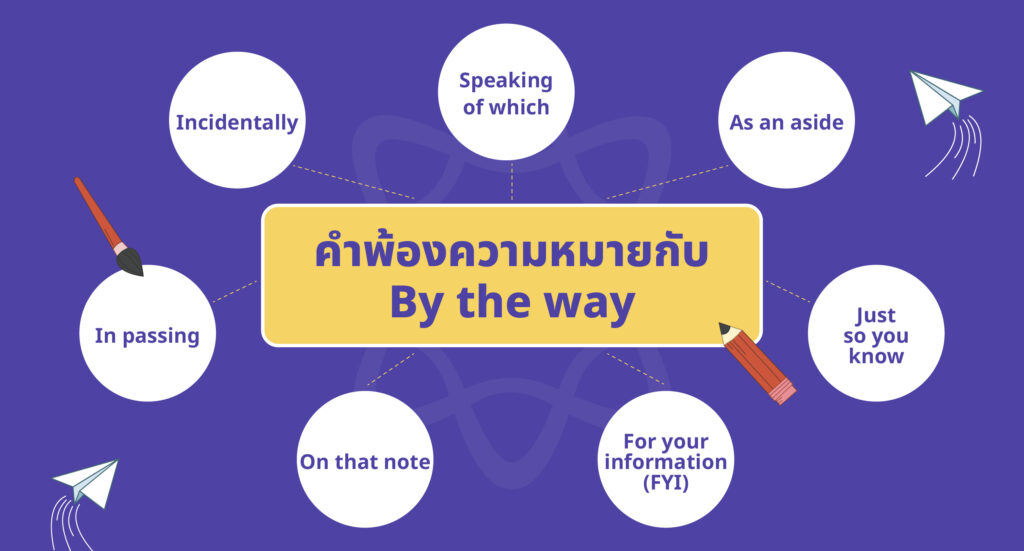
แยกแยะความแตกต่าง By the way กับ Anyway อย่างละเอียด
| แยกแยะ | By the way | Anyway |
| ความหมาย | อนึ่ง ว่าแต่ | Anyway แปลว่า อย่างไรก็ตาม ยังไงก็ตาม สรุปคือ |
| วิธีใช้ | – ใช้เพื่อเปลี่ยนหัวข้อหรือเพิ่มข้อมูลใหม่ในการสนทนา ข้อมูลนี้อาจเกี่ยวข้องโดยตรงกับหัวข้อหลักหรือไม่ก็ได้ – ใช้เพื่ออ้างถึงหัวข้อที่จู่ ๆ ผู้พูดก็นึกถึงขณะพูดถึงเรื่องอื่น | ใช้เพื่อจบเรื่อง เปลี่ยนเรื่องอื่น หรือแนะนำข้อมูลใหม่ ข้อมูลนี้ไม่เกี่ยวข้องและไม่สำคัญกับหัวข้อหลักมากเกินไป |
| ตัวอย่าง | You’re going to the store, right? By the way, can you buy some milk? (จะไปร้านค้าใช่ไหม ยังไงก็ฝากซื้อนมให้หน่อยได้ไหม) | I didn’t do well on the test, but anyway, I’ll try harder next time. (ฉันทำข้อสอบได้ไม่ดีนักแต่คราวหน้าฉันจะพยายามให้มากขึ้น) |

คําถามที่พบบ่อย
By the way ตัวย่อ
ตัวย่อของ By the way คือ BTW
ตัวอย่าง: BTW, do you know the schedule for tomorrow? (BTW คุณรู้ตารางเวลาของวันพรุ่งนี้ไหม?)
>>> Read more: 100+ ตัวย่อภาษาอังกฤษที่ใช้มากที่สุด!
By the way สุภาพไหม?
By the way ถือเป็นวลีสุภาพและมักใช้ในการสนทนาในชีวิตประจำวันหรือปฏิสัมพันธ์ทางสังคม อย่างไรก็ตาม By the way ไม่เหมาะสมในบริบทที่เป็นทางการ เช่น อีเมลทำงาน หรือสุนทรพจน์ที่เป็นทางการ
แบบฝึกหัด
แบบฝึกหัดที่ 1: จงเลือก By the way หรือ Anyway เพื่อเติมแต่ละประโยคต่อไปนี้ให้สมบูรณ์
1. I saw John yesterday. _______, did you hear about his new job?
2. The meeting was a disaster. _______, I need to get started on that report.
3. She’s a talented musician. _______, her paintings are also quite impressive.
4. I’m really tired. _______, let’s change the subject.
5. We’re going to the beach tomorrow. _______, don’t forget your sunscreen.
6. The food was awful. _______, the service was terrible too.
7. I had a long conversation with my mother. _______, she’s coming to visit next week.
8. He failed the exam. _______, he’s decided to retake it.
9. It’s raining outside. _______, I’m not going out today.
10. We’re short on staff. _______, could you help out with deliveries today?
11. The project is almost finished. _______, we need to schedule a final meeting.
12. I saw a beautiful bird this morning. _______, what time is the meeting again?
13. The game was exciting. _______, I’m glad we won.
14. I had a great time at the party. _______, I met some interesting people.
15. It’s getting late. _______, I should probably get going.
เฉลย:
| 1. By the way | 2. Anyway | 3. By the way | 4. Anyway | 5. By the way |
| 6. Anyway | 7. By the way | 8. Anyway | 9. Anyway | 10. By the way |
| 11. By the way | 12. By the way | 13. Anyway | 14. By the way | 15. Anyway |
แบบฝึกหัดที่ 2: จงเขียนประโยคที่สมบูรณ์หนึ่งประโยคโดยใช้คำว่า by the way และอีกประโยคหนึ่งโดยใช้ anyway ซึ่งขึ้นอยู่กับแต่ละสถานการณ์ที่กำหนด
1. คุณกำลังพูดถึงการไปเที่ยวและจำได้ว่าคุณลืมซื้ออะไรบางอย่าง
2. คุณกำลังบ่นเกี่ยวกับสภาพอากาศเลวร้ายและต้องการเปลี่ยนเรื่อง
3. คุณกำลังพูดถึงแผนช่วงสุดสัปดาห์และจำได้ว่ามีเหตุการณ์สำคัญที่กำลังจะเกิดขึ้น
4. คุณกำลังหารือเกี่ยวกับปัญหาการทำงานที่ซับซ้อน และต้องการยุติการสนทนา
5. คุณกำลังพูดถึงภาพยนตร์ที่คุณดูและคิดถึงรายละเอียดที่น่าสนใจเกี่ยวกับนักแสดงหลัก
เฉลย:
1. By the way: We had a great time at the beach yesterday! By the way, I completely forgot to buy sunscreen.
Anyway: We had a great time at the beach yesterday, even though it was crowded. Anyway, I need to get back to work.
2. By the way: I’ve been complaining about this awful weather for too long. By the way, did you watch the game last night?
Anyway: This weather is awful. Anyway, let’s talk about something more cheerful.
3. By the way: I’m planning to go hiking this weekend. By the way, don’t forget my birthday is next week!
Anyway: I’m planning a camping trip this weekend. Anyway, I should start packing my bags.
4. By the way: This project is really complicated! By the way, I need to attend another meeting.
Anyway: This problem is a real headache. Anyway, let’s move on to the next item.
5. By the way: That movie was amazing! By the way, did you know the lead actor is also a talented musician?
Anyway: The movie was excellent. Anyway, it’s late, I should go to sleep now.
บทความข้างต้นเป็นข้อมูลทั้งหมดคำถาม By the way แปลว่า และวิธีการใช้ By the way หวังว่าการแบ่งปันข้างต้นจะช่วยให้คุณเข้าใจวลีนี้ได้ดีขึ้น นอกจากนี้ อย่าลืมแวะมาที่ ELSA Speak เป็นประจำเพื่ออัปเดทความรู้ภาษาอังกฤษล่าสุดทุกวันนะ!
ในชีวิตประจำวันที่เร่งรีบ การพักผ่อนนอกจากจะช่วยลดความเครียดแล้ว ยังช่วยสร้างสมดุลและเพิ่มพลังบวกให้กับชีวิตของเราด้วย คุณเคยสงสัยไหมว่า พักผ่อนเยอะๆ ภาษาอังกฤษ จะเขียนหรือพูดว่าอย่างไร บทความนี้จาก ELSA Speak จะพาคุณไปค้นพบความหมาย สำนวนที่น่าสนใจ และวิธีการใช้คำศัพท์ที่เกี่ยวข้องกับการพักผ่อนในภาษาอังกฤษ ไปดูกันเลย!
พักผ่อนเยอะๆ ภาษาอังกฤษ คืออะไร?

การพักผ่อนเยอะๆ หรือพักผ่อนให้มากขึ้นในภาษาอังกฤษคือ Get lots of rest หรือ Rest up ซึ่งหมายถึงการแนะนำให้ใครสักคนหาเวลาพักผ่อนเพื่อฟื้นฟูร่างกายและจิตใจ
- Get lots of rest: แปลว่า พักผ่อนเยอะๆ หรือ นอนให้เพียงพอ วลีนี้มักใช้เมื่อคุณต้องการให้ผู้อื่นใส่ใจเรื่องการพักผ่อน โดยเฉพาะหลังจากทำงานหนัก เจ็บป่วย หรือเมื่อจำเป็นต้องฟื้นฟูพลังงาน
- Rest up: Rest up: หมายถึง พักผ่อน หรือ ฟื้นฟูสุขภาพ เป็นวิธีการพูดที่กระชับและนิยมใช้ในบริบทที่ไม่เป็นทางการหรือในชีวิตประจำวัน เพื่อเตือนให้ผู้อื่นพักผ่อนมากขึ้น
ทั้งสองวลีนี้ไม่เพียงแต่มีความหมายในการแนะนำ แต่ยังสะท้อนถึงความห่วงใยต่อสุขภาพและสภาพจิตใจของผู้ฟัง ไม่ว่าจะใช้ในสถานการณ์ใด คำแนะนำเหล่านี้ล้วนมีความหมายในเชิงบวกเพื่อเตือนให้ผู้อื่นดูแลสุขภาพของตัวเองให้ดี
>>> Read more: รวมแคปชั่นออกกําลังกายภาษาอังกฤษสั้น ๆ ตลก ๆ และประทับใจมากที่สุด

สำนวนเกี่ยวกับการพักผ่อนและผ่อนคลาย
| Idioms | ความหมาย | ตัวอย่าง |
| Take your mind off something. | หลุดพ้นจากความคิดเกี่ยวกับบางสิ่ง | Going for a walk helps me take my mind off work. (การเดินช่วยให้ฉันหลุดพ้นจากเรื่องงาน) |
| Footloose and fancy-free. | อิสระ ไร้พันธะ | After graduation, she felt footloose and fancy–free. (หลังจากเรียนจบ เธอรู้สึกเป็นอิสระและไร้พันธะ) |
| Take a chill pill. | สงบสติอารมณ์ ผ่อนคลาย | You need to take a chill pill and not stress so much. (คุณควรใจเย็นลงและไม่เครียดจนเกินไป) |
| Put your feet up. | พักผ่อน ผ่อนคลาย | After a long day, I like to put my feet up. (หลังจากวันอันยาวนาน ฉันชอบที่จะพักผ่อน) |
| Have a blast. | มีช่วงเวลาที่สนุกสนาน | We had a blast at the concert last night! เราได้มีช่วงเวลาที่สนุกสนานที่คอนเสิร์ตเมื่อคืนนี้!) |
| Blow off some steam. | คลายเครียด | He went for a run to blow off some steam. (เขาออกไปวิ่งเพื่อคลายเครียด) |
| Take a rest. | พักผ่อน | You should take a rest if you’re feeling tired. คุณควรพักผ่อนถ้ารู้สึกเหนื่อย) |
| Stop and smell the roses. | ดื่มด่ำกับชีวิต ใส่ใจกับสิ่งสวยงาม | Sometimes you just need to stop and smell the roses. (บางครั้งคุณแค่ต้องหยุดและชื่นชมสิ่งสวยงาม) |
| Take a break. | พักสักครู่ | Let’s take a break and grab some coffee. (มาพักกันสักครู่แล้วไปดื่มกาแฟกันเถอะ) |
| Put your feet up. | พักผ่อน ผ่อนคลาย | After the meeting, I like to put my feet up for a bit. (หลังประชุม ฉันชอบพักผ่อนสักหน่อย) |
| Take it easy. | ผ่อนคลาย อย่าเครียดเกินไป | Just take it easy and everything will work out. (ผ่อนคลายเถอะ ทุกอย่างจะดีเอง) |
| Recharge your batteries. | เติมพลัง | I need a weekend to recharge my batteries. (ฉันต้องการวันหยุดสุดสัปดาห์เพื่อเติมพลัง) |
| Take time for yourself. | ใช้เวลาให้กับตัวเอง | It’s important to take time for yourself. (สิ่งสำคัญคือการใช้เวลาให้กับตัวเอง) |
| Clear your mind. | ทำจิตใจให้ปลอดโปร่ง | Meditation helps me clear my mind. (การนั่งสมาธิช่วยให้จิตใจของฉันปลอดโปร่ง) |
| Loosen up. | ผ่อนคลาย ไม่ซีเรียสมากเกินไป | You should loosen up and enjoy the party. (คุณควรผ่อนคลายและสนุกกับปาร์ตี้) |
| Chill (out). | ผ่อนคลาย ไม่ต้องกังวล | Just chill out, everything will be fine. (ผ่อนคลายเถอะ ทุกอย่างจะโอเค) |
| I’m resting. | ฉันกำลังพักผ่อน | I’m resting my eyes. (ฉันกำลังพักสายตาอยู่) |
| Try to rest. | พยายามพักผ่อน | You should try to rest more often. (คุณควรพยายามพักผ่อนให้บ่อยขึ้น) |
| You can rest. | คุณสามารถพักผ่อนได้ | You can rest if you feel tired. (คุณสามารถพักผ่อนได้ถ้ารู้สึกเหนื่อย) |
| You need rest. | คุณต้องการพักผ่อน | You need rest to feel better. (คุณต้องพักผ่อนเพื่อให้รู้สึกดีขึ้น) |
| Give it a rest. | พักสักหน่อย | Just give it a rest for now. (แค่พักสักหน่อยตอนนี้) |
| I have to rest. | ฉันต้องพักผ่อน | I have to rest before the meeting. (ฉันต้องพักก่อน ประชุม) |
| I want to rest. | ฉันอยากพักผ่อน | I want to rest before dinner. (ฉันอยากพักก่อน อาหารเย็น) |
| You should rest. | คุณควรพักผ่อน | You should rest after a long day. (คุณควรพักผ่อนหลังจากวันที่ยาวนาน) |
| Can I rest a bit? | ฉันสามารถพักสักหน่อยได้ไหม? | Can I rest a bit before we leave? ฉันสามารถพักสักหน่อยก่อนเราไปได้ไหม?) |
| It’s time to rest. | ถึงเวลาพักผ่อน | It’s time to rest after all the work. (ถึงเวลาพักผ่อนหลังจากงานทั้งหมด) |
| Let’s take a rest. | มาพักกันสักหน่อย | Let’s take a rest after the hike. (มาพักสักหน่อยหลังเดินทางไกล) |
| May I take a rest? | ฉันสามารถพักสักหน่อยได้ไหม? | May I take a rest before the next meeting? ฉันสามารถพักสักหน่อยก่อนประชุมครั้งต่อไปได้ไหม?) |
| I feel like a rest. | ฉันรู้สึกอยากพักผ่อน | I feel like a rest after this busy day. (ฉันรู้สึกอยากพักผ่อนหลังจากวันนี้ยุ่งมาก) |
| I need her rest. | ฉันต้องการพักผ่อน | I needs her rest to recover. (ฉันต้องการพักผ่อนเพื่อฟื้นตัว) |
| I just want to rest. | ฉันแค่อยากพักผ่อน | I just want to rest for a while. (ฉันแค่อยากพักสักครู่) |
| I should be resting. | ฉันควรกำลังพักผ่อน | I should be resting instead of working. (ฉันควรกำลังพักผ่อนแทนที่จะทำงาน) |
| Where’s the nearest restroom? | ห้องน้ำที่ใกล้ที่สุดอยู่ที่ไหน? | Where’s the nearest restroom? (ห้องน้ำที่ใกล้ที่สุดอยู่ที่ไหน?) |
| Rest in peace. | หลับให้สบาย | Rest in peace, dear friend. (หลับให้สบาย เพื่อนรัก) |
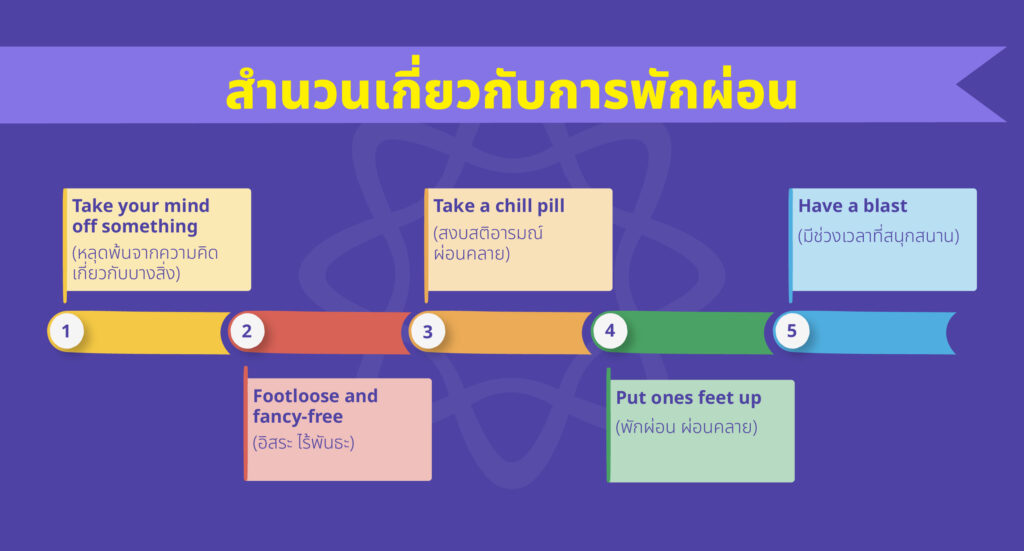
>>> Read more: สำนวนเกี่ยวกับสุขภาพ
คำศัพท์ที่เกี่ยวข้องกับการพักผ่อน
| คำศัพท์ | การสะกดคำ | ความหมาย | ตัวอย่าง |
| Rest | /rɛst/ | พักผ่อน | After a long day, I need to take a rest. (หลังจากวันอันยาวนาน ฉันต้องพักผ่อน) |
| Relax | /rɪˈlæks/ | ผ่อนคลาย ทำให้สบาย | I like to relax by reading a book. (ฉันชอบผ่อนคลายด้วยการอ่านหนังสือ) |
| Leisure | /ˈliːʒər/ | เวลาว่าง กิจกรรมบันเทิง | He spends his leisure time watching movies. (เขาใช้เวลาว่างในการดูหนัง) |
| Rejuvenate | /rɪˈdʒuːvəneɪt/ | ทำให้สดชื่น ฟื้นฟูพลังงาน | A weekend getaway can rejuvenate your spirit. (การเดินทางสุดสัปดาห์สามารถฟื้นฟูจิตใจคุณได้) |
| Unwind | /ʌnˈwaɪnd/ | ผ่อนคลาย คลายเครียด | Listening to music helps me unwind. (การฟังเพลงช่วยให้ฉันผ่อนคลาย) |
| Break | /breɪk/ | พักสั้น ๆ ช่วงเวลาพัก | I take a short break every hour to stay focused. (ฉันพักสั้น ๆ ทุกชั่วโมงเพื่อโฟกัส) |
| Escape | /ɪˈskeɪp/ | หลบหนี ออกจากความจริง | Sometimes, I just want to escape to the mountains. (บางครั้ง ฉันแค่อยากหลบหนีไปบนภูเขา) |
| Recharge | /rɪˈtʃɑːrdʒ/ | เติมพลัง | A good nights sleep helps me recharge. (การนอนหลับที่ดีย่อมช่วยเติมพลัง) |
| Pamper | /ˈpæmpər/ | ดูแลตัวเองอย่างดี | I like to pamper myself with a spa day. (ฉันชอบดูแลตัวเองด้วยการทำสปา) |
| Meditate | /ˈmɛdɪˌteɪt/ | ทำสมาธิ ครุ่นคิด | I meditate for ten minutes each morning. (ฉันทำสมาธิ 10 นาทีทุกเช้า) |
| Soothe | /suːð/ | บรรเทา ทำให้สงบ | A warm bath can soothe your muscles. (การแช่น้ำอุ่นช่วยผ่อนคลายกล้ามเนื้อของคุณ) |
| Retreat | /rɪˈtriːt/ | ถอยหลัง สถานที่พักผ่อน | We went to a yoga retreat in the countryside. (พวกเราไปเข้าค่ายโยคะที่ชนบท) |
| Tranquil | /ˈtræŋkwɪl/ | เงียบสงบ สงบสุข | The tranquil lake was perfect for a picnic. (ทะเลสาบที่เงียบสงบเหมาะกับการปิกนิก) |
| Calm | /kɑːm/ | สงบ อ่อนโยน | She took deep breaths to remain calm. (เธอหายใจลึก ๆ เพื่อรักษาความสงบ) |
| Serenity | /səˈrɛnɪti/ | ความสงบสุข ความเงียบสงบ | The serenity of the forest was refreshing. (ความเงียบสงบของป่าไม้ให้ความรู้สึกสดชื่นจริง ๆ) |
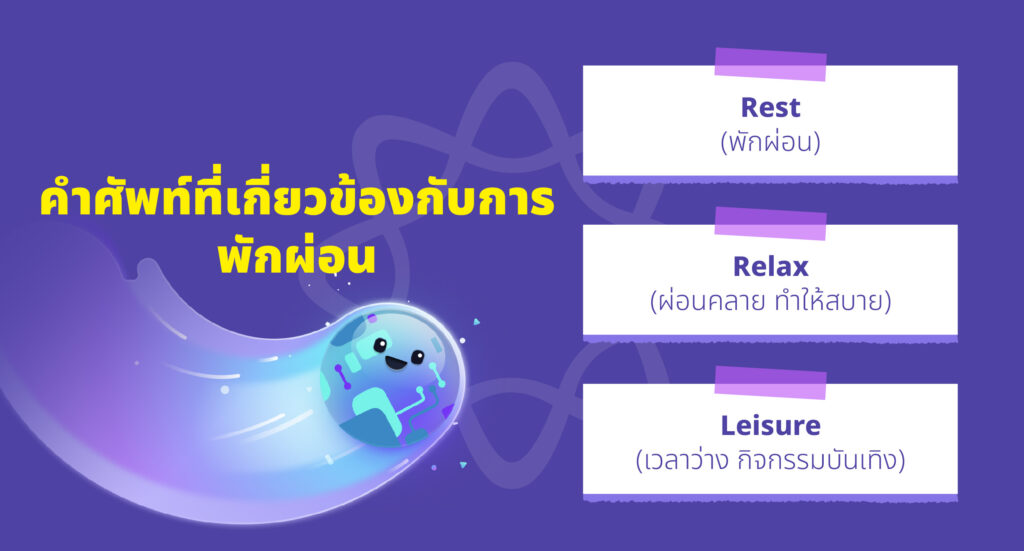
>>> Read more: 100+ แคปชั่น relax time ในภาษาอังกฤษพร้อมความหมายที่ดีที่สุด
การแยกความแตกต่างระหว่าง take a rest – get some rest
ผู้เรียนภาษาอังกฤษหลายคนมักสับสนระหว่าง take a rest และ get some rest และบางครั้งใช้แทนกันได้ในทุกสถานการณ์ อย่างไรก็ตาม มีความแตกต่างบางประการที่ควรสังเกตเพื่อให้ใช้ได้อย่างถูกต้องและเหมาะสม
| วลี | ความหมาย | บริบทการใช้ | ตัวอย่าง |
| Take a rest | การพักผ่อนชั่วคราวเพื่อฟื้นฟูพลังงาน มักใช้หลังทำงานหรือในช่วงพักสั้น ๆ | ใช้ในสถานการณ์ที่ไม่เป็นทางการมาก เมื่อพูดถึงการพักระหว่างกิจกรรมหรือการทำงาน | Everyone should take a rest in the middle of this 3-hour session. (ทุกคนควรพักระหว่างเซสชัน 3 ชั่วโมงนี้) |
| Get some rest | การพักผ่อนทั่วไป โดยเฉพาะเมื่อมีคนต้องฟื้นฟูสุขภาพหรือจิตใจเนื่องจากความเหนื่อยล้า | ใช้เมื่อแนะนำให้คนอื่นพักผ่อนเพื่อปรับปรุงสุขภาพหรือฟื้นฟูพลังงาน | You look exhausted. You should get some rest to refresh yourself first. (คุณดูเหนื่อยมาก ควรพักผ่อนเพื่อฟื้นฟูตัวเองก่อน) |
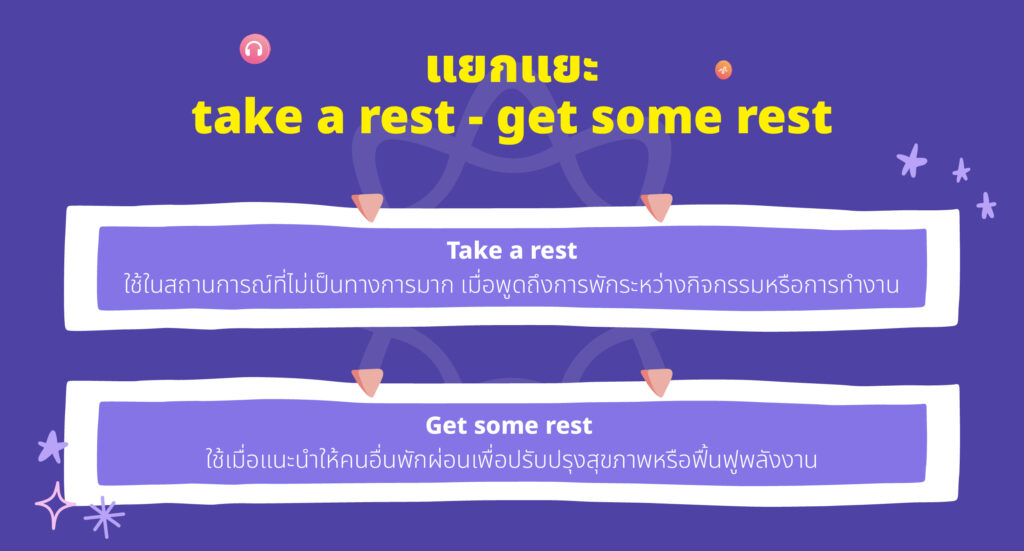
คำถามที่เกี่ยวข้อง
The rest ใช้ยังไง?
The rest มักใช้เพื่อหมายถึงส่วนที่เหลือของสิ่งใดสิ่งหนึ่ง เช่น I have finished my work, and now I will focus on the rest.
พักผ่อน มีคำว่าอะไรบ้าง?
คำศัพท์บางคำที่เกี่ยวข้องกับการพักผ่อน ได้แก่ relax, rest, unwind, take a break และ recharge
เทคแคร์ ใช้ยังไง?
วลี take care มักใช้เพื่ออวยพรให้ใครบางคนดูแลตัวเอง เช่น Take care and see you soon!
เหนื่อยมาทั้งวัน พักผ่อนเยอะๆ ภาษาอังกฤษ
You must be tired after a long day, make sure to rest a lot!
อย่าลืมพักผ่อนเยอะๆ ภาษาอังกฤษ
Don’t forget to take plenty of rest!
ทํางานหนัก พักผ่อนบ้างนะ ภาษาอังกฤษ
You’ve worked hard, so take a little time to relax!
ดูแลตัวเองด้วยนะ ฉันเป็นห่วง ภาษาอังกฤษ
Take care of yourself; I worry about you.
นอนพักผ่อนเยอะๆ ภาษาอังกฤษ
Make sure to get plenty of sleep!
ฉันกำลังผ่อนคลายในภาษาอังกฤษคืออะไร?
ฉันกำลังผ่อนคลายในภาษาอังกฤษคือ I am relaxing
การผ่อนคลายในวันสุดสัปดาห์ในภาษาอังกฤษคืออะไร?
การผ่อนคลายในวันสุดสัปดาห์ในภาษาอังกฤษคือ weekend relaxation.
เวลาในการผ่อนคลายในภาษาอังกฤษ
เวลาในการผ่อนคลายในภาษาอังกฤษคือ relaxation time.
วิธีพูดแทน relax และ chill ในภาษาอังกฤษ
วิธีพูดแทน relax และ chill ได้แก่ unwind, take it easy, de-stress และ kick back
การผ่อนคลายไม่เพียงช่วยลดความเครียด แต่ยังช่วยให้คุณได้เพลิดเพลินกับชีวิตอย่างมีความหมายมากขึ้น ด้วยคำศัพท์และวิธีการแสดงออกที่แบ่งปันในบทความนี้ คุณสามารถเข้าใจวิธีการบอกให้ พักผ่อนเยอะๆ ในภาษาอังกฤษ แล้ว เพื่อฝึกออกเสียงให้ชัดเจนและใช้ภาษาอังกฤษได้อย่างเป็นธรรมชาติมากขึ้น ให้แอปพลิเคชัน ELSA Speak เป็นผู้ช่วยที่มีประโยชน์ในการพิชิตภาษาอังกฤษของคุณอย่างมีประสิทธิภาพ!